Resilience
Collaboration
Click here to go to the Strategy Hub
Scotland's Museums & Galleries
Find out what’s happening in the sector around you in our directory of Scotland’s Museums and Galleries.
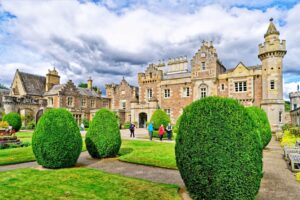
Abbotsford
Abbotsford, the home of Sir Walter Scott, chronicles the life of Scotland’s most famous author. Abbotsford House and Gardens paint an intimate portrait of Scott’s life and interests. The permanent exhibition in the visitor centre follows the life of Sir Walter Scott from his birth in 1771 to his death in 1832.
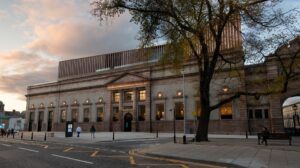
Aberdeen Art Gallery
Winner of the Art Fund Museum of the Year in 2020, Aberdeen Art Gallery has steadily grown its collection since its opening in 1885. The Gallery holds works by important Scottish artists such as Henry Raeburn, William Dyce and Joan Eardley, and a growing contemporary collection including sculptures by Kenny Hunter and Barbara Hepworth.
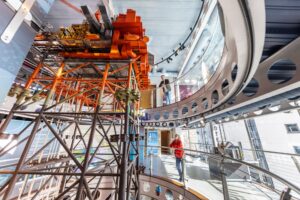
Aberdeen Maritime Museum
Located near the harbour in in the historic Shiprow, Aberdeen Maritime Museum tells the story of the city’s connection with the sea. From early fishing, trade, and shipbuilding, through to the discovery of North Sea oil and the transition to green energy, the collection includes highlights such as ship models, a complete lighthouse lens assembly and the entire deck of a historic steamer.
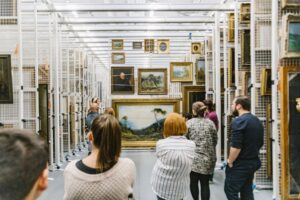
Aberdeen Treasure Hub
Aberdeen Treasure Hub is the collection store of Aberdeen Archives, Gallery and Museums. Over 100,000 items are stored in the hub when not on display.

Aberdeenshire Farming Museum
Situated within Aden Country Park, Aberdeenshire Farming Museum recreates the experience of farming and agriculture in North East Scotland. Telling the history of the land and the people who farmed it.

Admiral Ramsay Museum
Admiral Sir Bertram Ramsay commanded the Dunkirk Evacuation in 1940 and the naval part of the D-Day Landings in 1944. Admiral Ramsay Museum opened in 2023, in memory of him and all who served at Dunkirk, D-Day, and World War 2.

Alford Heritage Museum
Located within a former agricultural auction market building, Alford Heritage Museum.
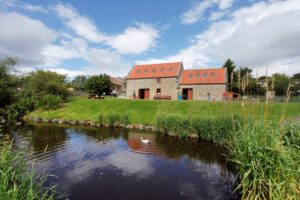
Almond Valley Heritage Centre
Almond Valley offers a huge variety of fun and informative activity for people of all ages. The fields, woods and green spaces of the Almond Valley site extend for nearly a mile either side of the river Almond. At its heart lies the old buildings of Livingston Mill and the nearby Mill Farm which is home to all manner of animals. The shale oil museum, a collection which has been Recognised as being of national significance to Scotland, contains fascinating interactive displays.

Alness Heritage Centre
Alness Heritage Centre preserves and exhibits the social history of the local area.

Alyth Museum
The Alyth Museum, located in the old library in Alyth, tells the story of the community with photographs of the village and its environs. The collection includes local agrarian history and cottage industries. A notable item in the collection is the Blairgowrie Drunk’s Cart which was used in the 19th century to return those who had enjoyed a little too much of the local hospitality, back to their homes.

An lodhlann/Tiree Historical Centre
An Iodhlann, the Historical Centre on the island of Tiree, collects and preserves the stories of the island, it’s people and the wider diaspora. Its name, pronounced ‘an-ee-lun’, is Gaelic for the stackyard where the harvest is stored.

Anatomical Museum, University of Edinburgh
The Anatomical Museum at University of Edinburgh is part of the School of Biomedical Sciences within the College of Medicine and Veterinary Medicine. The collection includes dissection specimens, skeletons and teaching models as well as a significant collection of archive material and rare books. The collections contribute to the story of Edinburgh’s role in the teaching and practice of medicine, which directly influenced the understanding and practice of medicine across the world.

Anatomy Museum, University of Aberdeen
The Anatomy Museum at the University of Aberdeen contains a wide-ranging collection, with specimens that can be traced back to the 1870s. The collection has been driven by the research and teaching activities of University staff since the late 19th century, which excellent collections of skeletal material, human tissue specimens, modern and historical anatomical models, and anatomical works on paper, including anatomical watercolours. Due to legal constraints, access to the collection is restricted to medical students and researchers.

Anatomy Museum, University of Glasgow
Located in the Thomson Building, the Anatomy Museum at The Hunterian showcases a selection of William Hunter’s Pathology collection, which was formerly housed in Glasgow Royal Infirmary (other specimens are not on display but can be accessed for research at request). These collections have considerable importance in the history and development of medicine, an include a range of remarkable specimens which reflect Hunter’s successful career as a pioneering anatomist and obstetrician.
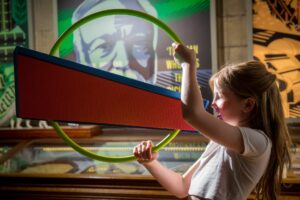
Andrew Carnegie Birthplace Museum
Andrew Carnegie was a Scottish born Industrialist and Philanthropist whose life was a true “rags-to-riches” story. The Andrew Carnegie Birthplace Museum chronicles his life story from the weaver’s cottage in which he was born, to the present-day charitable trusts and foundations that he established. The wider museum collection also contains objects relating to the life of Carnegie and his family.
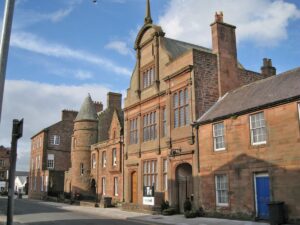
Annan Museum
Annan Museum houses a permanent exhibition on the history of Annan and the local area. The museum covers the prehistoric period up to the post World War II era. The museum also displays archelogy items are part of the Recognised Collection cared for by Dumfries and Galloway Museum Service.
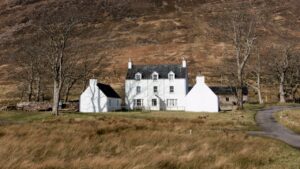
Applecross Heritage Centre
Located within a former manse and glebe, Applecross Heritage Centre is a museum and research centre committed to preserving and promoting the history of the local area. The Centre is run by volunteers from the Applecross Historical Society.
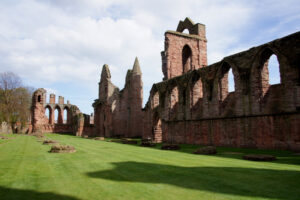
Arbroath Abbey
Located in the medieval ruins of the abbey, founded by William the Lion in 1178, the museum exhibits carved stones that once formed part of the monastic buildings and archaeology discovered across the site.
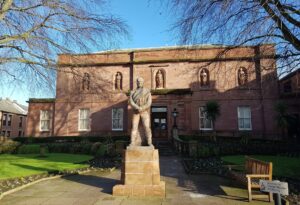
Arbroath Art Gallery
Located within Arbroath Library, the Corsar and Brothock Galleries display artworks from the collection held by Angus Council. Notable artists within the collection include William Lamb, David Waterson, and James Watterson. The collection also includes artwork by Peter Bruegel the younger.
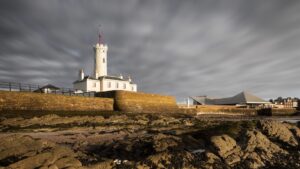
Arbroath Signal Tower Museum
The Signal Tower Museum details the history of the Bell Rock Lighthouse, the world’s oldest working sea-washed lighthouse. The museum outlines how the lighthouse was designed and built by notable engineer, Robert Stevenson, and shares experiences of the lives of lighthouse keepers living and working on Bell Rock. The collection provides an insight in to Arbroath’s fishing and maritime activities.

Arbuthnot Museum
The Arbuthnot Museum is named after local collector and philanthropist Adam Arbuthnot, who donated his private collection to form the museum. The displays cover Peterhead's history and its connections with the fishing and whaling industries. The collections include a significant coin collection and ethnographic artefacts which are of international interest.

Arctic Convoy Museum
The Arctic Convoy Museum is dedicated to preserving the memory of the WW2 Arctic Convoys on Loch Ewe, as this was a point of departure for many of the convoys bound for Russia. The museum houses an extensive collection of artefacts, photographs, and documents related to the Arctic Convoys. Visitors can also take part in interactive exhibits and activities, such as learning about the wartime experience of those who served on the convoys.
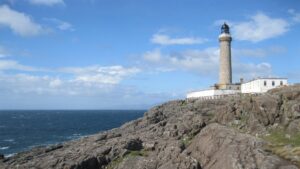
Ardnamurchan Lighthouse Visitor Centre
Built on the most westerly point of mainland Great Britain, The Ardnamurchan Lighthouse Visitor Centre has permanent exhibitions on the history of the lighthouse, local geology, and the flora and fauna of the area. The lighthouse itself is now fully automated but the lighthouse building is open to visitors to climb the stairs and ladders to the top.
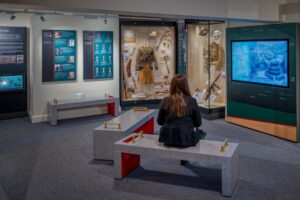
Argyll and Sutherland Highlanders Regimental Museum
Located within the Kings Old Building in Stirling Castle, The Argyll and Sutherland Highlanders Regimental Museum covers the history of the 91st Argyllshire Highlanders and the 93rd Sutherland Highlanders who amalgamated in 1881 to form the Argyll and Sutherland Highlanders regiment. The collections include paintings, uniforms, weapons, silver, regimental colours, pipe banners, and medals.

Armadale Community Museum
Armadale Community Museum exhibits historical objects significant to the local area.
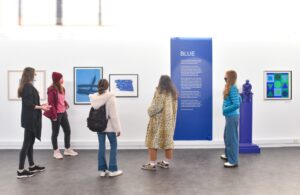
Art Collection, University of Stirling
The University of Stirling Art Collection comprises of 20th and 21st century Scottish contemporary paintings, prints, tapestries and sculptures. The collection was founded by Professor Tom Cottrell, the University’s first Principal, in 1967. He believed that art should be on display across the campus as “part of the everyday life” of staff and students. The Collection is displayed in the Pathfoot Building gallery space, and large outdoor sculptures are visible in the grounds of the campus.

Art in Healthcare
Art in Healthcare facilitate the display of artworks in healthcare venues across Scotland, believing in the positive health and wellbeing benefits of the visual arts.

Atholl Country Life Museum
In the former village school of Blair Atholl, the museum encourages visitors to explore the characters of the area, experience a reconstruction of a 1930s post office, and learn about the area's agricultural past.
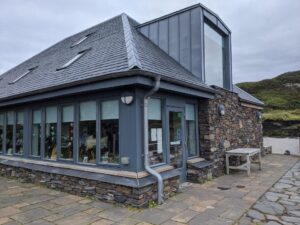
Atlantic Islands Centre
The Atlantic Islands Centre on the Isle of Luing has permanent exhibitions on the local history of the area and the slate industry that was prevailant on the islands.
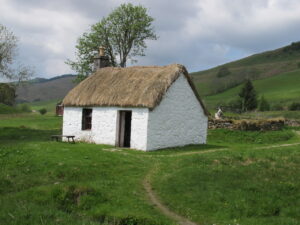
Auchindrain
The best-preserved example of a Scottish Highland farm township, the museum offers the opportunity for visitors to immerse themselves in the settlements and see how ordinary people worked and lived.
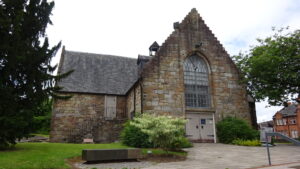
Auld Kirk Museum
The Auld Kirk Museum, based in one of the oldest buildings in Kirkintilloch, features displays on the local history of the area and artwork by notable local artists.

Baird Institute Museum
The Baird Institute is home to a local museum, holding collections of Mauchline Ware and other items of Cumnock Pottery as well as a wide range of resources relating to the history of Cumnock and the Doon Valley area. It also has a changing programme of contemporary art exhibitions, events and workshops.

Ballogie Soutar’s Shop
Ballogie Soutar’s (shoe-maker’s) Shop, is the only intact rural soutar shop in Scotland. Built originally in 1896, the museum holds a collection of original shoe boxes, tools, and other related materials.

Banchory Museum
Banchory Museum features local history displays, including the life of Banchory-born musician and composer James Scott Skinner, and the town's connection to Royal Deeside.

Barra Heritage and Cultural Centre / Dualchas
Barra Heritage Centre displays artefacts, documents, photographs, archives and collections on the history and culture of Barra & Vatersay.

Battle Of Prestonpans Museum and Jacobite Heritage Centre
The Battle of Prestonpans Jacobite Museum tells the story of the battle through a three-dimensional replica of the battlefield landscape, alongside historical and archaeological artefacts. It also displays sections of the famous Prestonpans Tapestry.

Beith Cultural and Heritage Society
Run by volunteers, the Beith Cultural and Heritage Society was formed to preserve memories and artefacts from the town of Beith and nearby villages and hamlets. Occupying an historic Townhouse, regular exhibitions and fundraising events are held for the local community. The Garnock Valley Family History Group are also based here providing monthly talks.

Bell Pettigrew Museum
Part of the University of St Andrews, the museum dates from 1912 and has a fantastic display of fossils, skeletons, taxidermy, and spirit collections housed in original display cases.

Bennie Museum
The Bennie Museum, located in Bathgate, is a museum of local history and life. It is run entirely by volunteers under the management of a Charitable Trust. The Museum offers special exhibitions on a regular basis, covering subjects as diverse as the annual Newlands Day Procession, local anniversaries, and subjects of general interest, such as toys, as well as public lectures and school visits.
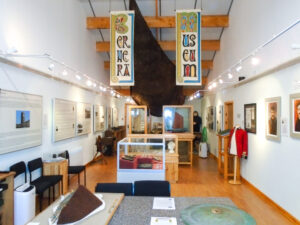
Bernera Museum
Bernera Museum tells the story of Bernera’s history, with a collection that includes artifacts from the Iron Age Village dig at Bosta Beach, stories of events within local history, and equipment and artifacts form local industries, including fishing. The genealogy of local families and crofts are collected and shared in the Museum’s archive, and they welcome visitors looking to explore their ancestry. The Museum also contains Bernera Community Café, which is run by volunteers and offers home made soup, hot and cold snacks, and home baking.
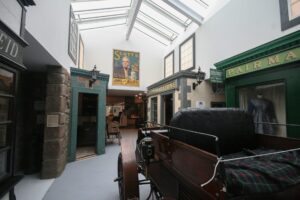
Biggar and Upper Clydesdale Museum
Biggar and Upper Clydesdale Museum sits in the heart of Biggar and has large collections of local natural and social history. It contains numerous faithful reconstructions of historic shops in its Gladstone Court Streetscape, including an apothecary’s shop, grocer, bookmaker/printer, and ironmonger. Recently refurbished, the museum has a shop and community space that is used by schools, art groups, and local history researchers.
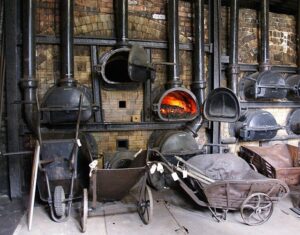
Biggar Gasworks Museum
Biggar Gasworks is the only preserved gasworks left in Scotland. Between 1839 and 1973 the site made coal and gas for Biggar and the surrounding district. Alongside the visitor centre, many of the buildings and equipment remain and you can still see some of the steam-driven machines used for producing and distributing gas.

Black Watch Castle and Museum
The Black Watch Museum is located in the centre of Perth and offers an opportunity to for visitors to immerse themselves in the extraordinary history of the Black Watch Regiment, formed in 1739. The collection is wide-ranging, including uniforms, fine art, medals, photography, diaries, weapons and military equipment, alongside film and oral history records, from the establishment of the regiment up to present day conflicts. The museum offers quiet times (With reduced light and sound) for those who need a calmer space to explore the story of Scotland’s oldest Highland regiment on Thursdays and Sundays.

Blackridge Community Museum
Blackridge Community Museum shares physical and digital exhibitions that explore the stories of Blackridge’s rich past. The museum collection includes Blackridge’s digital mining memorial, as well as a mining exhibition which has been co-curated by pupils from Blackridge Primary School. The museum is open on Mondays and Tuesday evenings.

Blairs Museum: Scottish Catholic Heritage Collections
Blairs Museum is a museum of Scottish Catholic Heritage, and is managed by the Scottish Catholic Heritage Collection Trust. The museum was originally linked to and located in Blairs College near Aberdeen, which was a Catholic Seminary. Many of the objects are linked to the college and catholic heritage in North East Scotland, or connected to Catholic religious heritage in Scotland more widely. The museum is currently temporary closed in Aberdeenshire, and planning a relocation to Glasgow.
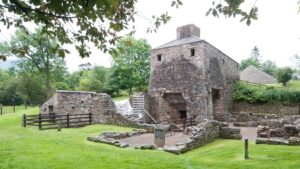
Bonawe Historic Iron Furnace
Dating from 1753, Bonawe is the most complete charcoal-fuelled ironworks left in Britain. Visitors can see how pig iron was made, including cannonballs used in the Napoleonic Wars. Surrounded by the Glen Nant National Nature Reserve and the oak woods that used to supply fuel for Bonawe.
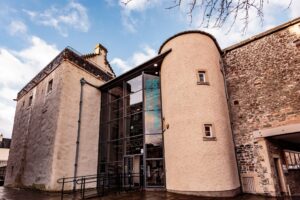
Borders Textile Towerhouse
Borders Textile Towerhouse tells the story of the region’s knitwear and tweed industries in a beautiful restored 16 century towerhouse. Located in the heart of Hawick, Border Textile Towerhouse collections of garments, artifacts and photographs display bring to life over 200 years of tradition and innovation in the local woollen industries. The museum changing exhibitions of contemporary fashion, design, art, and craft continue to display the significance of Hawick in the global world of quality textiles. The building is a focal point of Hawick’s annual Common Ridings.
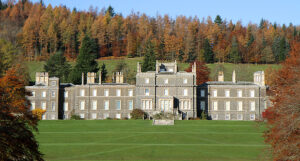
Bowhill House
At Bowhill House, the inspirational country home of the Buccleuch family, visitors can escape to a hidden haven in the heart of the Scottish Borders. Winding glens and enchanting forests surround a house full of history and art, where tours, activities, exhibitions, and an adventure playground offer an engaging experience for the whole family. The extensive estate offers a range of sporting and event opportunities, including self-catering accommodation on site.
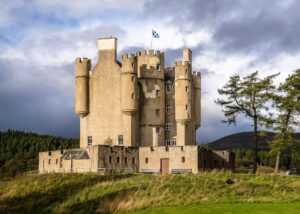
Braemar Castle
Located close the village of Braemar, Braemar Castle belonged to the chief of Farquharson and is loaned to a local charity.

Braemar Highland Games Centre
The Highland Games Centre, Braemar, incorporates an exhibition hall, gallery, archive, café and shop. The exhibition explores the living traditions of the Highland games, focusing on the Braemar Gathering and its long-standing royal connections. The site is also home of the Braemar Royal Highland Society Archive, which tells the story of the Society and the Braemar Gathering, of key interest for researchers in the fields of Scottish traditional sports, piping, Highland dancing, the Royal Family and friendly/mutual benefit societies.
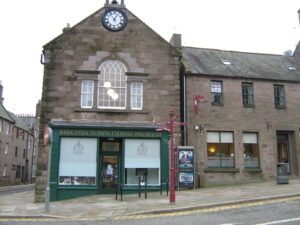
Brechin Town House Museum
Brechin Town House Museum is located in the centre of the Cathedral City of Brechin, and contains local history exhibitions, including a model of Brechin in miniature, based on the 1822 map created by cartographer John Wood. Brechin Town House Museum features a changing programme of contemporary exhibitions, including visual art as well as a variety of fascinating talks.

Bressay Heritage Centre
The Bressay Heritage Centre, situated at the Bressay ferry terminal, is a local exhibition space. Bressay has been inhabited for the past 6000 years and the burnt mounds, brochs and Neolithic remains in locations across the Island offer visitors a fascinating view into the distant past. The Centre houses an extensive archive of material relating to the island’s history through photographs, maps, and genealogy, and is open seasonally.
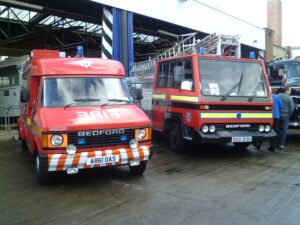
Bridgeton Bus Garage
The Bridgeton Bus Garage was established at the end of 2002 and has around 150 buses, coaches, commercial vehicles and fire appliances in their collection.
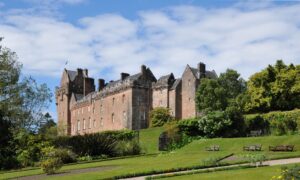
Brodick Castle
Brodick Castle, located on the Isle of Arran in Scotland, was originally built by the powerful Hamilton family and is now owned by the National Trust for Scotland.

Brora Heritage Centre
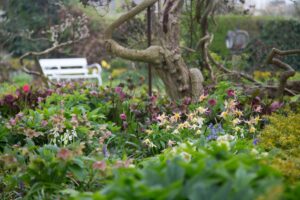
Broughton House and Garden/ E A Hornel Art Gallery and Library
Situated on the banks of the River Dee in Kirkcudbright, Broughton House was the home of Scots impressionist artist E. A. Hornel between 1901 and 1933. The house contains a library of 15,000 books collected by Hornel, including a 2,500-volume collection relating to Robert Burns. The library also holds Hornel's archive of newspaper clippings, letters, and other material. The studio is maintained as it would have looked when the artist was at work. Paintings by Hornel and antiquities collected by him can also be seen here, as well as in Kirkcudbright Galleries and the Stewartry Museum.
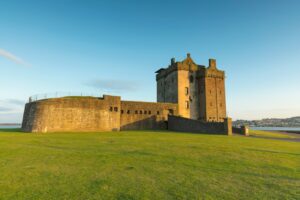
Broughty Castle Museum
Broughty Castle, built in 1496, sits on a rocky promontory at the mouth of the River Tay. The Castle Museum houses displays on the people, environment and wildlife of the local area, with sweeping views over the river. Only minutes away from Broughty Ferry beach and esplanade, the Castle offers a changing programme of events, activities, and displays.

Broxburn Community Museum
Broxburn Community Museum, located in Broxburn, located in Broxburn Library, explores the social and industrial history of the local area. Current exhibitions showcase what life was like in the Broxburn miners' rows and explore leisure activities in the 1940s and 1950s.

Buckhaven Museum
Buckhaven Museum, adjacent to Buckhaven Library, celebrates the industrial and social history of the local area, from fishing village to mining town. Social and culinary history is explored in a replica 1920s kitchen, which looks at changes to cooking habits over the past century.

Buckie and District Heritage Centre
Buckie Museum seeks to preserve the character, history, and traditions of the fishing and boatbuilding industries in the Buckie district. Run by volunteers, the Museum has a substantial database of the history of locally built boats, dating from the late 19th century to the present day.
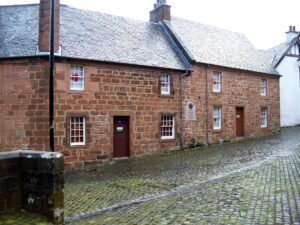
Burns House Museum
The Burns House Museum in Mauchline, East Ayrshire, is based at a farm in Mossgiel, where Burns and his wife Jean Armour lodged whilst preparing for their move to Ellisland Farm in Dumfriesshire. Through the display of original manuscripts, objects, and contemporary commissions, the Museum interprets Burns’ time in Mauchline and his relations with many of its residents, who influenced his most prolific period of work. The museum’s Robert Burns Collection is officially recognised as being of national significance as part of the wider collections cared for by the Museums of the Burns Scotland Partnership.

Burntisland Library and Museum
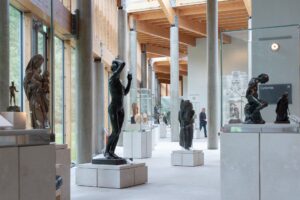
Burrell Collection, The
Housing the vast and varied collections of Sir William and Constance Burrell, The Burrell Collection is situated in a purpose-built museum in the heart of Pollok Country Park, Glasgow. The collection of over 9000 objects ranges from Qing Dynasty vases to paintings by Edouard Manet.
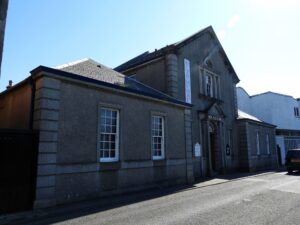
Bute Museum
Located in a purpose-built building gifted by the 4th Marquess of Bute in 1926, the museum explores the history of Bute and the area's natural history. The collection includes the "Queen of the Inch" jet necklace.
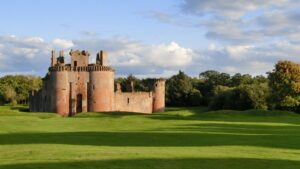
Caerlaverock Castle
Caerlaverock Castle, one of the most iconic castles in Scotland, is triangular in plan with a wide moat, twin-towered gatehouse and lofty battlements. It was in the possession of the Maxwell family from the 13th to 17th centuries and was besieged by the English during the Wars of Scottish Independence. The site has a café and exhibition space looking at the role of the Castle across the centuries. It is situated close to an RSPB site.
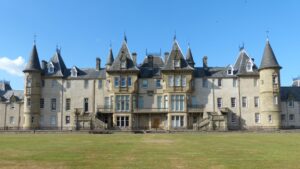
Callendar House
Set within Callendar Park, featuring a section of Roman Antonine Wall, Callendar House has a changing programme of contemporary and visual art exhibitions.

Campbeltown Heritage Centre
Campbeltown Heritage Centre is home to over 300 years of social history, spanning from the creation of Campbeltown to the present day. The Centre sits on the site of the Gaelic Free Church, built in 1868 and is the main holder of social history for the Kintyre Peninsula.

Campbeltown Museum
Campbeltown Museum presents the story of Kintyre. It's collection includes pieces of archaeology, fine art, natural sciences and social history.

Carsphairn Heritage Centre
Carsphairn Heritage Centre was purpose built in 1992 to house Carsphairn Heritage Group's collection of local artefacts and to provide a space for exhibitions. The Centre also provides resources and a focus point for visitors carrying out family research. Located in the village of Carsphairn near the Galloway Ayrshire border, it is a base to explore the evocative surrounding landscape including the Rhinns of Kells (mountain ridge) and the Green Well of Scotland. The local area of Knockengorroch also hosts an annual world ceilidh festival.

Castle Douglas Art Gallery
In 1938 a talented artist called Ethel Bristowe gifted Castle Douglas Art Gallery to the town. The gallery was developed in 1996 and now forms a venue for contemporary art and craft exhibitions. The programme runs from March to Christmas showcasing both group and individual works from across the region.

Castle House Museum
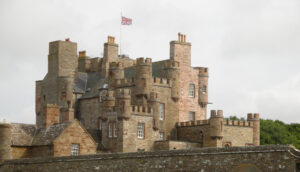
Castle of Mey
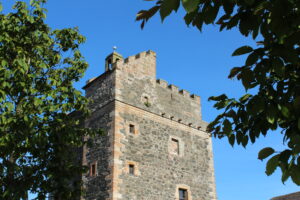
Castle of St John Heritage Centre
The Castle of St. John sits at the heart of Stranraer. It was built by one of the most powerful Lairds of Wigtownshire, Ninian Adair of Kilhurst, and dates to around 1500. Through its history, the Castle was a tower house, a lodging for government troops during the ‘Killing Times’ when the Covenanters were persecuted by the Crown, as well as Victorian prison. All these periods are covered in a museum exhibition within. Original architectural features include a garderobe and pit prison, and fine views can be had from the tower roof. It also has interactive displays on each floor for children.

Castlehill Heritage Centre

Centre for Research Collections and Art Collection
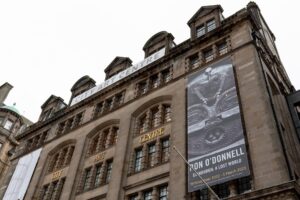
City Art Centre
City Art Centre is located in the middle of Edinburgh, directly opposite Waverley Station. It is managed by Museums & Galleries Edinburgh, and contains the internationally renowned art collection of the City of Edinburgh. The Scottish Art Collection of City of Edinburgh Museums and Galleries is a Recognised Collection of National Significance which is displayed largely at the City Art Centre.

Clan Cameron Museum

Clan Gunn Museum
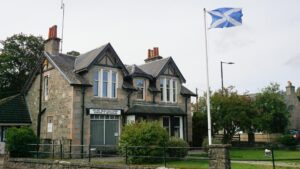
Clan Macpherson House and Museum
The Clan Macpherson Museum holds objects relating to the history of the Clan Macpherson, and is located in Newtonmore, Highland – the centre of ‘Macpherson Country’.
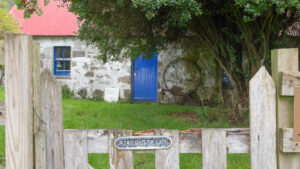
Cleadale Crofting Museum

Clydebank Heritage Centre

Clydebank Museum
Clydebank Museum celebrates the town’s history of engineering and industry, and contains a wide range of objects related to these industries. Of particular note is the museum’s collection of Singer Sewing Machines, which were manufactured in the town from 1884 until 1981. The museum collection includes examples of both domestic and industrial machines, and is displayed alongside other artifacts related to the Singer company and the people who worked in the factory.
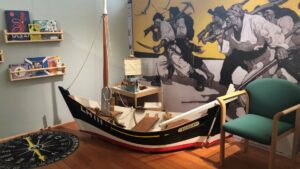
Coastal Communities Museum
The Coastal Communities Museum is located above the library in North Berwick, East Lothian. The museum tells to story of North Berwick as well as several other coastal communities in the area, including Aberlady, Gullane and Dirleton. A major object is a reconstructed light from the local lighthouse.

Cockburn Museum University of Edinburgh
Cockburn Museum holds an extensive collection of geological specimens that reflect the whole spectrum of Earth science materials. This includes minerals, rocks, meteorites and fossils, as well as historical objects such as maps and photographs.

Coldstream Museum
Coldstream Museum covers the history and culture of this Scottish borders area, including the famous Coldstream Guards. The museum's Courtyard Gallery features temporary exhibitions promoting local artists and contemporary art.
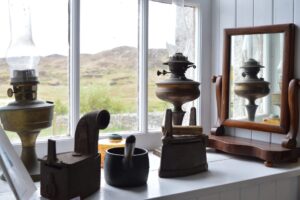
Colonsay and Oronsay Heritage Centre
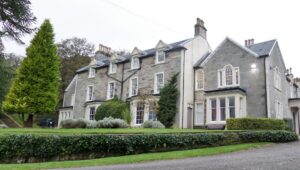
Colzium Museum
The displays in the Colzium House and Museum share the heritage of the surrounding area and include objects from the nearby castles of Colzium and Kilsyth as well as photographs and artefacts from the domestic and industrial settings of the locality.
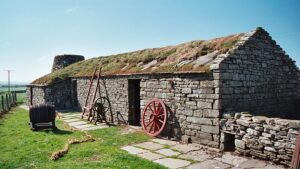
Corrigall Farm Museum
Corrigall Farm Museum is a traditional ‘but and ben’ laid out as a typical Orkney farmhouse would have been in the late 19th century. The site has a working barn, grain kiln, horse-drawn machinery and livestock. A peat fire recreates the atmosphere of the farm.

Corstorphine Heritage Centre, The
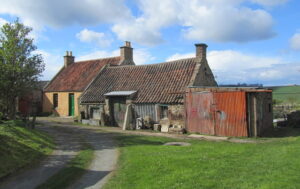
Cousland Smiddy

Crail Museum & Heritage Centre
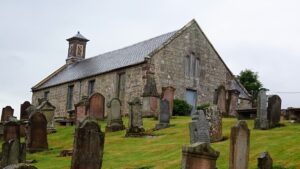
Crawfordjohn Heritage Venture
Crawfordjohn Heritage Venture is situated in the heard of Crawfordjohn – a predominantly rural community in the hills of South Lanarkshire, close to the border with Dumfriesshire. The museum is situated in a former church, and houses collections relating to the village and surrounding area. It also has a strong family history resource.

Creetown Heritage Museum
Creetown Heritage Museum preserves and displays the local history of the village – several hundred artefacts and photographies are on permanent display. Sections include natural history, the story of industrial Creetown (including the quarrying of granite), social history displays relating to villager exploits during WW1 and WW2. The Museum also holds information about and a work by celebrated stone-carver Hideo Furuta, as well as a 4 metre tall wooden recreation of a ‘Wicker Man’ commemorating the many local sites that used in the filming of the 1973 British horror classic. Activities for children are spread throughout.

Crieff and Strathearn Museum
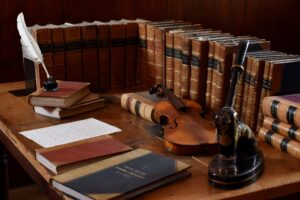
Cromarty Courthouse Museum
Cromarty Courthouse Museum is an A-listed 18th century building dedicated to the history of Cromarty and its neighbouring parish of Resolis. The museum is free to enter and contains a courtroom, jail cells and a temporary exhibitions space, as well as permanent displays on local industry, trade, and traditions. Soundscapes and mannequins add to the immersion of the courtroom and cells.
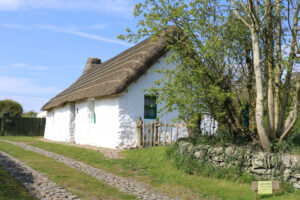
Cruck Cottage
Cruck Cottage was originally constructed in the 18th century and is maintained and run by Cruck Cottage Heritage. The cottage is unique to the area and is the only remaining example of this type of construction which would be common in the 18th and 19th centuries. Visitors are welcome to the cottage to enjoy their open days, craft demonstrations, school visits, and musical and storytelling evenings.
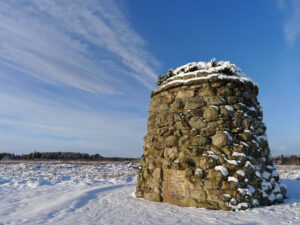
Culloden Visitor Centre
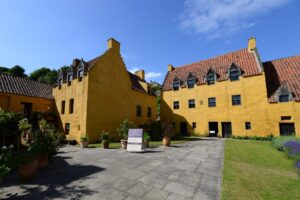
Culross Palace, Town House and Study
Run by the National Trust for Scotland, Culross is a rare example of a 17th/18th century burgh. In the centre of its cobbled streets is the palace, with its original painted woodwork and restored interiors.
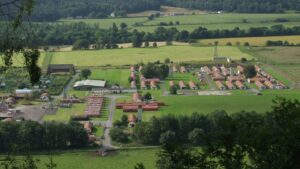
Cultybraggan Camp Museum

Cumbernauld Museum
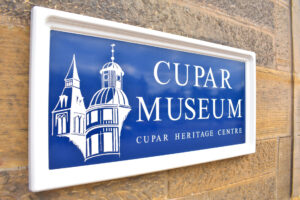
Cupar Heritage Centre

D’Arcy Thompson Zoology Museum
The D’Arcy Thompson Zoology Museum is part of the University of Dundee, located in the Carnelley Building, just behind the main University Tower Building in the city centre. Founded based on the collection of D’Arcy Wentworth Thompson, a professor of biology at University of Dundee, in the 1880s. The Museum has many thousands of specimens, aiming to keep the feel of the original Victorian museum, while also updating the interpretive approaches to allow 21st century visitors to explore a range of stories, including those of Antarctic exploration, zoological extinction, and the development of Dundee’s 19th and 20th century industries.

Dalbeattie Museum
A trust-run museum that cares displays a range of local memorabilia, art, and historical artefacts. The museum recreates a world from yesteryear, with reconstructed war bunker, old iron stove and a mug reputedly owned by Jean Armour. The museum is strongly connected to the community, and was founded by a local man and initially built up by community volunteers.

Dalgarven Mill/ Museum of Ayrshire Country Life and Costume
Housed in a working Victorian granary mill, Dalgaven Mill showcases the industry and rural life of the surrounding area. A dedicated costume collection is housed on the ground floor.
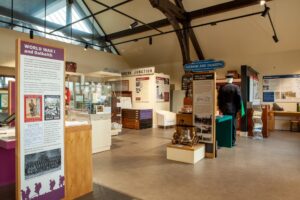
Dalkeith Museum
Dalkeith Museum is located in Dalkeith’s A-Listed Victorian Corn Exchange in Midlothian. Run by Dalkeith History Society, the Museum explores the rich history and heritage of Dalkeith. The oldest artifact in the Museum is a whinstone head, believed to be Roman, while the Museum also tells the exciting stories of the town’s social, industrial, and cultural past through the 19th and 20th centuries.
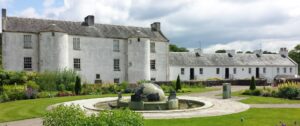
David Livingstone Birthplace
Set within parkland on the banks of the river Clyde the David Livingstone Birthplace Museum explores Livingstone's life. The collection includes many of Livingstone's personal belongings as well as items collected by Livingstone during his international expeditions. The museum has a legacy space which is intended to give a balanced view of Livingstone and the contradictory nature of his work.
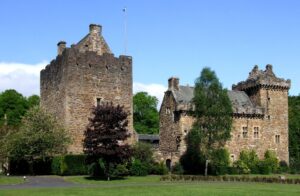
Dean Castle
Dean Castle was the home and of the Boyd family for over 400 years, it tells the story of medieval life and displays East Ayrshire’s stunning collection of arms, armour and early musical instruments.
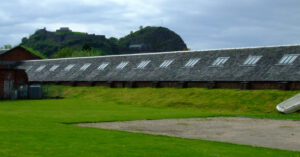
Denny Ship Model Experiment Tank
The Denny Ship Model Experiment Tank, located in Dumbarton, highlights how William Denny and Brothers’ innovative and experimental approach to shipbuilding made waves in the shipbuilding industry from the 1800s to 1963. At this family-friendly museum, you can see see the world’s first commercial ship model experiment tank, the length of a football pitch, learn about the builders of the famous Cutty Sark, and enjoy interactive games, trails, and activities.
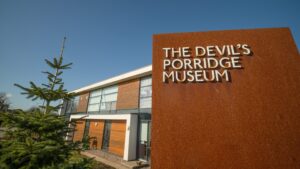
Devil’s Porridge Museum
Focussed on the HM Factory Gretna, the Devil’s Porridge Museum explores the intertwined stories of military and civilian life on the Solway Coast from the First World War onwards.
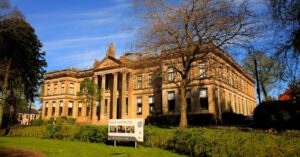
Dick Institute Museum and Art Gallery
Opened in 1901, the Dick Institute is a 4 star attraction which offers a programme of temporary exhibitions, permanent displays of the museum’s diverse collections and innovative work by contemporary artists, film makers and young people from the area.
The South Museum and Loom Room feature stories of the local and social history of the area. A recent refurbishment and the addition of a cafe make this a great place to visit.
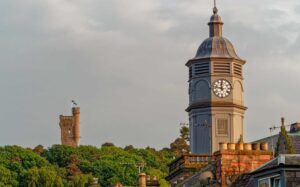
Dingwall Museum
Located in Dingwall’s historic Town House, this museum charts the history of the area from Pictish tribes and Viking settlers through to the modern day. The museum has large displays on the town’s political, military, and commercial history.
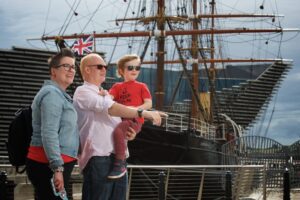
Discovery Point
Dedicated to Dundee’s maritime heritage, Discovery Point's collection includes the RRS Discovery - a ship built for Antarctic exploration. Discovery Point is housed in a building with a unique Discovery Dome which offers an immersive experience of the city and the River Tay.

Dollar Museum
Dollar Museum is independent local museum dedicated to the history & heritage of the village of Dollar in the county of Clackmannanshire. Established in 1988, this museum has two floors of an early 19th century woollen mill with a broad Collection which depicts the history of Dollar.

Douglas Heritage Museum
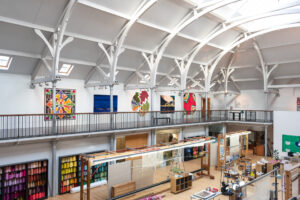
Dovecot Studios
Dovecot Studios is a tapestry studio and a hub for contemporary artists, crafters, and weavers located in the heart of Edinburgh. Dovecot collaborates with leading international artists through commissioning from private and public collectors from across the world. Dovecot also runs an exciting programme of exhibitions and events on contemporary art, craft, and design.
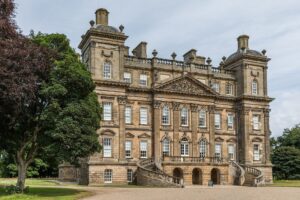
Duff House
Housing a collection including paintings from the National Galleries Scotland, Duff House is located near the royal burgh of Banff in the North East of Scotland. Since its construction as a baroque-style country house in the 18th century, Duff house has been used variously as a family home, hotel, sanatorium and prisoner-of-war camp, finally opening for its current use in 1995.

Dumbarton Castle
Dumbarton Castle has the longest recorded history of any stronghold in Scotland. It sits on a volcanic plug of basalt known as Dumbarton Rock which is 240 feet high and overlooks the Scottish town of Dumbarton.

Dumbarton Heritage Centre
Dumbarton Heritage Centre, located in Dumbarton, shares a unique collection of information on the history and culture of the Dumbarton and Vale of Leven area. The heritage centre houses numerous collections relating to Dumbarton and the Vale of Leven, and has a broad range of programming, including genealogical archives, a research facility, and local history librarians who can offer support. Regularly changing exhibitions reflect the history of Dumbarton and the surrounding area.
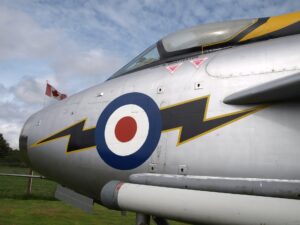
Dumfries and Galloway Aviation Museum
A small independent museum that covers the history of aviation in region. The museum has a collection of aircraft, including a Battle of Britain veteran Loch Doon Spitfire, a supersonic Lightning Fighter and a wartime assault glider collection. There are dedicated displays on the Home Front, RAF Dumfries and the Bomber War, and has the only dedicated Airborne Forces collection in Scotland.
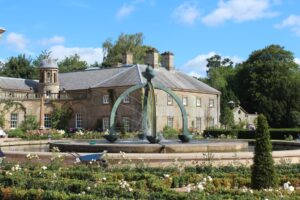
Dumfries House
Dumfries House near Cumnock in East Ayrshire was built in the eighteenth-century and contains a large collection of period furniture - including fine examples of the work of Thomas Chippendale – as well as many fine art works. The estate encompasses a walled garden, maze, an education farm, dovecot, and arboretum; the estate also cares for community facilities such as the New Cumnock outdoor pool.
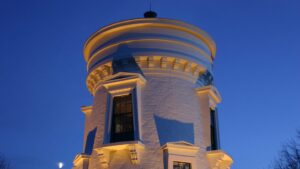
Dumfries Museum and Camera Obscura
Dumfries Museum was founded in 1835 as an astronomical observatory and museum in an eighteenth-century windmill. A camera obscura was installed and opened to the public in 1836 and this is still in use and is regularly demonstrated to visitors. The museum tells the story of the land and people of the region; prehistoric fossilised footprints, natural history collections, tools and weapons from prehistory, stone carvings by Scotland’s first Christians and the everyday things of the Victorian farm, workshop and home. The museum also hosts a programme of special exhibitions, events and family activities throughout the year.
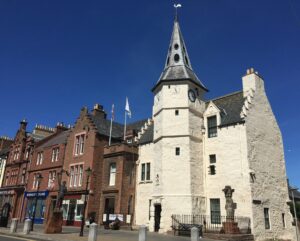
Dunbar Town House Museum and Gallery

Dunbeath Heritage Museum
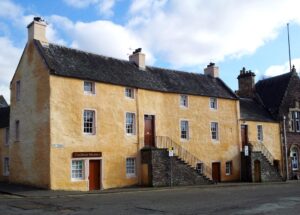
Dunblane Museum
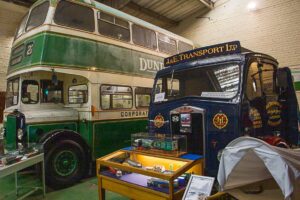
Dundee Museum of Transport
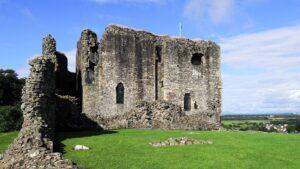
Dundonald Castle
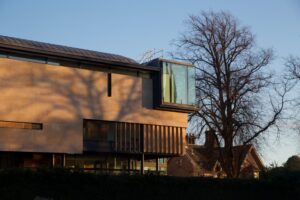
Dunfermline Carnegie Library and Galleries
Dunfermline Carnegie Library and Galleries is a mixed-use facility located in the centre of Dunfermline, Fife. The museum galleries explore topics such as Royal Dunfermline and the kings and queens buried in the grounds of the nearby Abbey, the local linen weaving and mining industries, and the city’s contributions to music focusing on artists such as Barbara Dickson, Big Country and Nazareth.
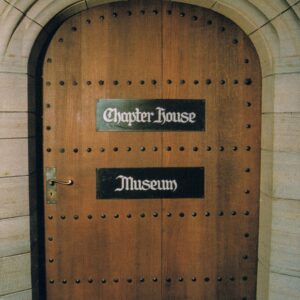
Dunkeld Cathedral Chapter House Museum
The Chapter House Museum is situated within the Chapter House of Dunkeld Cathedral. The Chapter House was built in 1457 and served as a Sacristy and meeting place for 100 years. After the Reformation it became the Atholl Mausoleum and contains some magnificent monuments and memorials. The Atholl coat of arms is mounted above the door and the former members of the family lie buried in an underfloor vault. The Museum holds a number of interesting artefacts and interpretative boards and an interactive digital screen telling the story of Dunkeld’s history. Their extensive archive is housed at 12 The Cross, Dunkeld.
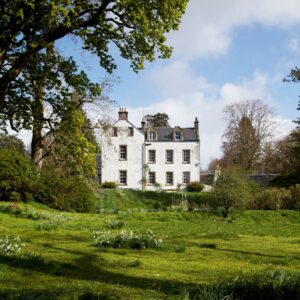
Dunollie House Museum

Dunrobin Castle Museum
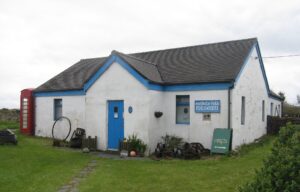
Easdale Island Folk Museum
Easdale Island Folk Museum on the Island of Easdale documents the history of life and community on the Island, including the significant slate quarrying that took place until the famous 1881 storm flooded the quarries. The museum contains objects on the role of the army, local education and public health.
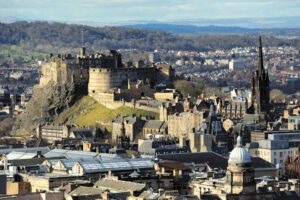
Edinburgh Castle
Edinburgh Castle, situated on Castle Rock in the centre of the city, is one of the most famous castles in Scotland. The Castle has been both a royal residence and strategic military garrison throughout its history.
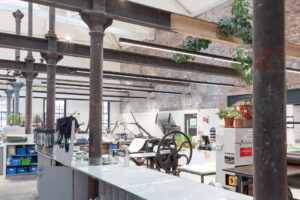
Edinburgh Printmakers
Edinburgh Printmakers is a centre for printmaking and the visual arts based in the Castle Mills building in Fountainbridge.
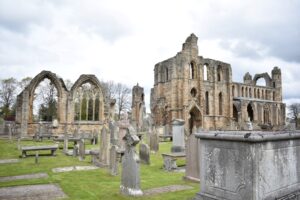
Elgin Cathedral
Elgin Cathedral, known as the "Lantern of the North", is a ruined medieval Cathedral. Permanent exhibitions tell the story of the Cathedral and the people who built it.

Elgin Museum
Elgin Museum is the oldest independent museum in Scotland, and is located in the centre of the town, near the cathedral. The museum cares for the renowned Fossil Collection of Elgin Museum, which is a Recognised Collection of National Significance.
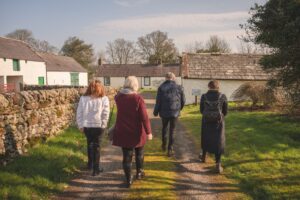
Ellisland Museum and Farm
Ellisland Farm was built by Robert Burns in 1788, adjoining a fertile strip of land on the River Nith. Burns lived there with his young wife Jean Armour and their family until 1791. During this time, Burns farmed the land and wrote much of his best-known work, including Auld Lang Syne and Tam o Shanter, My Heart’s in the Highlands, The Banks of Doon, Killiecrankie and John Anderson. Two rooms of the farmhouse have been preserved – including the original parlour - and a collection of artefacts and manuscripts can also be viewed, as well as outbuildings and the wider site with walks along the river.

Eyemouth Museum
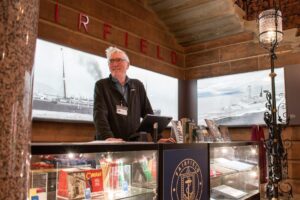
Fairfield Heritage
Located in the old headquarters of the Fairfield Shipbuilding & Engineering Company Ltd, Fairfield Heritage tells the story of Govan’s place in shipbuilding history from the 1800s to present day. Many of the rooms retain their original Victorian features and house objects, model ships and AV displays.

Ferryhill Railway
Based in the former Ferryhill locomotive depot, the Heritage Trust and associated Men’s Shed work to restore the depot, creating opportunities for participation in transforming the depot into a working museum where visitors can observe the restoration in progress.

Fetlar Interpretive Centre
A community museum with objects and films exploring island life from folklore and music to nature and crofting. Of note is the section on Scottish surgeon and bacteriologist Sir William Watson Cheyne who retired to Fetlar after his career where he helped pioneer the use of antiseptics in surgery.
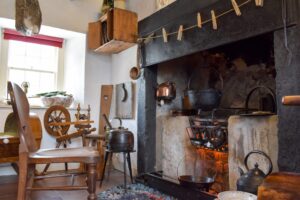
Fife Folk Museum
Located in the village of Ceres, and housed in a former tolbooth, weaver’s cottages and a contemporary visitor centre the Fife Folk Museum tells the story of the people of Fife through its social history collection.

Findhorn Heritage Centre and Ice House
The Findhorn Heritage Centre and Ice House explore the history of Findhorn from prehistoric times to present day. In the 150 year old underground icehouse you can see displays relating to the salmon fishing industry of the area.

Finlaggan Information Centre
The historic site at Finlaggan on Islay is an important part of Scottish Highland history, at one time the centre of the Lordship of the Isles. You can discover the remains of the buildings on the islands and explore the story in the visitor centre.

Fochabers Folk Museum and Dallachy Gallery
Fochabers Folk Museum has an eclectic social history collection on display, as well as a school room and a number of carriages.
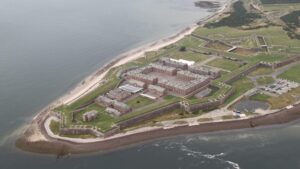
Fort George
Built following the Jacobite Rising of 1745 Fort George is an impressive fortification on the Moray coast. You can explore soldier’s living quarters in the barracks, walk along the ramparts and visit the grand magazine which has a collection of weapons on display.

Forth Bridge Heritage Centre
Discover the history of North Queensferry in the former train station.

Forth Bridges Lighthouse Museum
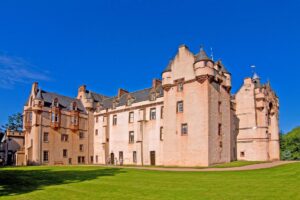
Fyvie Castle
Set in picturesque grounds with loch and walled garden, Fyvie is an 800 year old fortress full of art, tapestries and antiques. It holds a large collection of portraits by Raeburn, Gainsborough and Romney amongst others. Look out for the death mask of a murderer in the library.
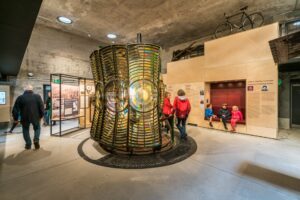
Gairloch Heritage Museum
Art Fund Museum of the Year 2020 winner, the museum includes permanent displays telling the history of the area and has an annual programme of exhibitions.
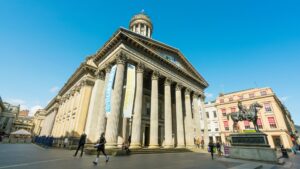
Gallery of Modern Art (GOMA)
Situated in a large, neoclassical, former merchant’s home in the heart of Glasgow, GoMA engages audiences through their vast modern art collection. Drawing on their building’s history of exchanging information and goods, GoMA centres the sharing of ideas and creativity through their evolving exhibitions and learning programmes.

Garioch Heritage Centre
Since 2017, Garioch Heritage Centre has been welcoming visitors to its home in the repurposed Inverurie Locomotive Works. The museum recounts life in Garioch all the way back to the earliest settlement in the area, through their displayed artefacts in the former Carriage and Waggon Workshop, and extensive photographic and archival materials, which can be accessed in a dedicated reading area.

George Waterston Memorial Museum
Located in the ‘Auld Skül’ on Fair Isle, George Waterston Memorial Centre & Museum tells the Island’s story through its intertwined social, natural and archaeological histories, including its world-famous knitting heritage.

Glasgow Museums Resource Centre
Containing the extensive collections of Glasgow Museums when they are not on display, Glasgow Museums Resource Centre (GMRC) is housed in a large, purpose-built facility. The approximately 1.4 million objects in GMRC are spread across a vast array of subject areas – from natural history to technology – and are available to visit through pre-booked tours.

Glasgow Police Museum
The Glasgow Police Museum tells the story of Britain’s First Police Force, The City of Glasgow Police, from their inception in 1779 through to their standing down in 1975. A volunteer-run museum, they share the force’s history through a unique collection of uniforms, artefacts and photographs.

Glasgow Print Studio
Founded by artists in 1972, Glasgow Print Studio is committed to ensuring that the West Coast’s unique print-making heritage is represented through its print archive, which is accessible by appointment. Glasgow Print Studio also facilitate the transferral of traditional printmaking skills through its workshops and facilities.

Glasgow Royal Infirmary Museum
Opened in May 2022 this small medical museum is the only on in Scotland within a working hospital. It celebrates the 200 year history of Glasgow Royal Imfirmary, and sell honey made in the hospital's herbal garden.

Glasgow School of Art, The
Housed in The Whisky Bond, The Glasgow School of Art’s (GSA) Archives and Collections reflect GSA’s lifetime as a centre for teaching and learning and are viewable both online and by appointment in person. Annually expanded with new student work, The GSA Archives and Collections contain mostly physical objects such as drawings, paintings, sculptures, furniture, and archival materials. There is also a small, growing collection of additional born-digital material.
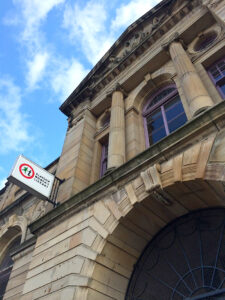
Glasgow Women’s Library
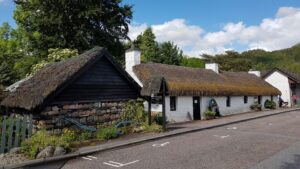
Glencoe Folk Museum
Founded, run, and supported by women since its inception in the 1960s, Glencoe Folk Museum tells the story of its village through an eclectic collection of objects – from a replica of the Ballachulish Figure to a coffin boat. The museum is set within two refurbished 18th-century cottages with heather-thatched roofs.

Glenesk Folk Museum
Glenesk Folk Museum’s collection of over thirty thousand objects tells the story of rural Angus life from the Bronze Age through to the mid-twentieth century.
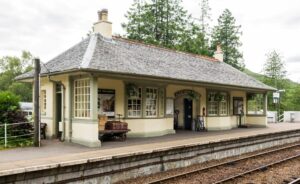
Glenfinnan Station Museum
Situated in a working railway station on the ‘Iron Road to the Isles’, Glenfinnan Station Museum tells the story of this scenic train route and the people who created it. The museum’s collection includes a restored 1901 signal box, the Jacobite steam train and a refurbished sleeping car.
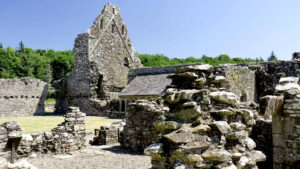
Glenluce Abbey
Containing examples of architecture from the 13th and 16th centuries, Glenluce Abbey offers visitors an opportunity to learn about Cistercian monastic life across four centuries in the valley of the Water of Luce. The museum also contains a collection of objects found on-site during clearance work.
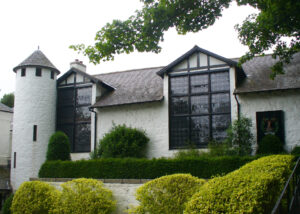
Gordon Highlanders Museum, The
The Gordon Highlanders Museum tells the stories of the variety of men who made up the regiment across its two-hundred-year history, through its collection of memorabilia, artefacts, and regimental silverware. The museum is located in the former home of a prominent Aberdonian artist, and a reconstructed Moffat Trench can be explored in the museum’s grounds.
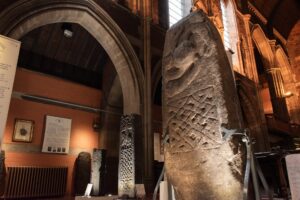
Govan Stones, The
Under the care of the community-run Govan Heritage Trust, The Govan Stones contain a unique collection of medieval stones carved between the 9th and 11th centuries. The Govan Stones are housed in the A-listed building Govan Old Church – one of the earliest sites of Christian worship in Scotland, and a burial ground since at least the 6th century.

Govanhill Baths Archives and Exhibition Space
The Govanhill Baths Archives and Exhibition Space occupy a unique building in Govanhill, run by and for its surrounding community. Their archive tells the building and neighbouring area’s history, and is split into three main categories: Before Closure (1914-200); Save Our Pool (2001-2004); and Govanhill Baths Community Trust (2005 onward).

Gracefield Arts Centre
Based in Dumfries, Gracefield Arts Centre hosts a changing schedule of temporary exhibitions, both from its own archive and from local, national, and international artists. Gracefield Arts Centre’s collection houses over 600 examples of Scottish paintings, drawings, and original prints.
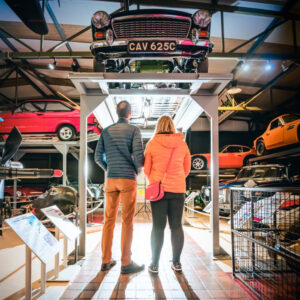
Grampian Transport Museum
Grampian Transport Museum is home to many interactive artefacts, from 19th-century travelling chariots to a 1980s Grampian Police Rover. The museum is based on and around the site of an old railway terminus in the village of Alford.
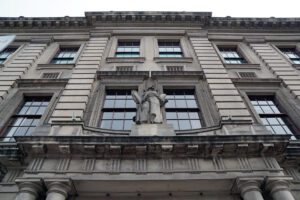
Grand Lodge of Scotland Museum
Situated in the centre of Edinburgh on George Street, The Grand Lodge of Scotland Museum houses a collection telling the material history of Scottish Freemasonry. The collection includes glassware, medals, silverware, ceramics, Masonic aprons, furniture, paintings, and more.

Grangemouth Heritage Trust
The Grangemouth Heritage Trust is dedicated to preserving and protecting the local area's history and culture. Established in 1999, the trust is based at the former Grangemouth Town Hall. It exhibitions include the town's history, from its industrial and social past to more recent developments.
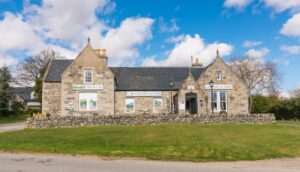
Grantown Museum
Housed in Burnfield House, Grantown Museum cares for and exhibits the archive of Grantown Society, which illustrates the history of the local area, including as the traditional home of Clan Grant. Burnfield House began its life as the Grantown Female School in 1861, and became home to Grantown Museum and Heritage Trust in 1995, opening to the public in 1999.
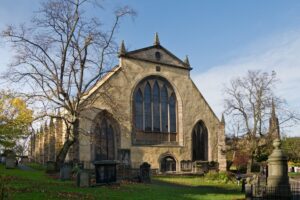
Greyfriars Kirk Museum
Set below the organ in Edinburgh’s Greyfriars Kirk since 2012, The Kirk Museum displays a collection of objects which tell the story of the church’s role historically and contemporarily. Greyfriar’s Kirk was the first church built in Scotland following the Reformation, a history reflected in its collection, which includes an original copy of the National Covenant.

Grimsay Boat Haven and Grimsay Archive
From its location at Ceann na h-Àirigh on the site of the former Kenary Church and Manse, Grimsay Boat Haven shares the Uists’ boatbuilding and fishing histories. The only maritime history museum in the Western Isles, it has a collection of five Stewart boats, as well as an archive of collected photos, oral histories and recordings.
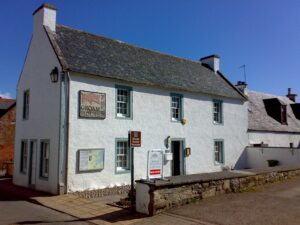
Groam House Museum
Groam House Museum houses a collection focused on three key areas: Pictish stones, local history, and the collection of Celtic Art teacher George Bain. Situated in the coastal village of Rosemarkie on the Black Isle, the museum moved in the 1970s into the 18th-century building from which it takes its name – Groam House.

Halliwell’s House Museum
Located on a row of some of the oldest houses remaining in Selkirk, Halliwell’s House is named after its wig-maker owner Walter Halliwell. The museum tells the story of this eighteenth-century building and the local town through a large collection of industrial heritage objects, as well as displays on the Selkirk Common Riding Festival.

Hawick Museum
Hawick Museum’s collection covers a broad range of subjects from the natural world to Ancient Egypt and their relation to the local town. The museum is housed in a historic 18th-century mansion, set in expansive grounds.
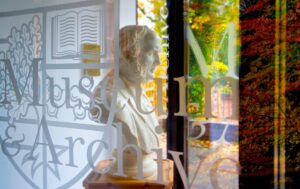
Heriot-Watt University Museum and Archive
Heriot-Watt University Museum and Archive’s collection documents the life of Heriot-Watt University, its surrounding community, as well as Southern Scottish textile Heritage. The museum is situated in the university’s Cameron Smail Library in Edinburgh.

Hibernian FC Historical Museum
Located at the Easter Road Stadium, the museum celebrates the Hibernian Football Club, the players, and the supporters.
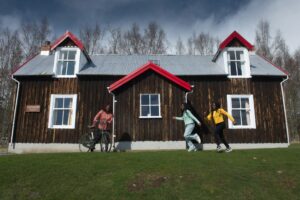
Highland Folk Museum
The Highland Folk Museum provides a unique look into the history and culture of the Scottish Highlands. The museum features a range of authentic buildings, artifacts, and interactive exhibits that help bring the past to life. A highlight of the museum is the recreated 19th-century rural Highland village, featuring a schoolhouse, post office, and a smithy.

Highland Museum of Childhood
Housed in a Victorian Railway Station in the spa village of Strathpeffer, The Highland Museum of Childhood shares histories of childhood in the Highlands through themes such as crofting life, schooling, and early years. Their collection includes interactive toys and games, allowing visitors a chance to reminisce.

Highlanders Museum/ The Queen’s Own Highlanders Regimental Museum
Based within Fort George, this former Lieutenant Govener's house is now home to a nationally recoginsed collection of military artefacts.
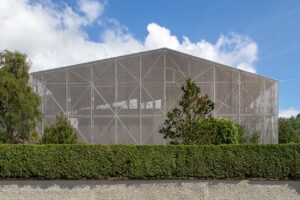
Hill House, The
Designed by Charles Rennie Mackintosh and Margaret Macdonald Mackintosh in 1900, The Hill House is situated in Helensburgh. The Hill House displays a unique collection of ‘Glasgow style’ furniture, textiles and architecture, and tells the story of its design and the Blackie family who lived there.

History of Education Centre (aka Victorian Schoolroom)
The History of Education Centre houses an eclectic collection of artefacts related to school – with everything from a Victorian abacus to a BBC Computer. Based in the former Victoria Primary School, visitors can explore a Victorian Schoolroom.

Historylinks Museum
Historylinks Museum shares stories of Dornoch’s heritage from pre-history through to its current image as a golfing town, through its wide-ranging collection. The museum is housed in a purpose-built Heritage Hub.
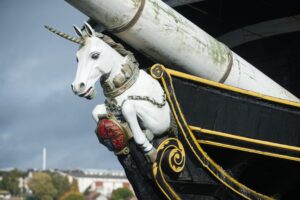
HMS Unicorn
HMS Unicorn is a preserved sailing frigate of the Royal Navy, launched in 1824. Now a maritime museum, located in Dundee, the museum showcases the life of the Royal Navy in the 19th century, with many interactive displays and artefacts. Visitors can explore the many decks of the ship and experience life on board a sailing frigate.
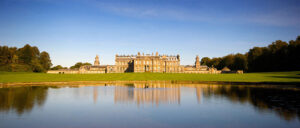
Hopetoun House
Originally constructed as a stately Georgian home between 1699 and 1707, Hopetoun House contains a collection which tells its story as the ancestral home of the Hope family.
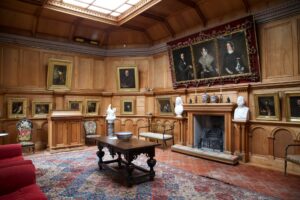
Hospitalfield
Housed on the site of a 13th-century hospital, Hospitalfield is made up of a collection of historic buildings from various periods. Their collection tells the story of Hospitalfield’s artistic history from the 19th century onwards, and is still added to contemporarily through their residency and commissions programme.
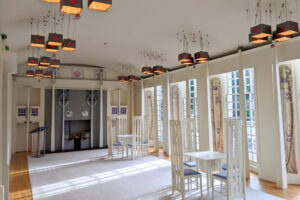
House for an Art Lover

House of Dun
A vast Georgian country house constructed in the 18th century to replace a medieval tower house, House of Dun contains a collection ranging from Jacobite artefacts to Angus Folk objects.
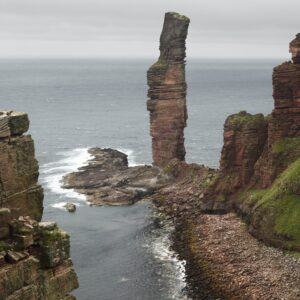
Hoy Heritage Centre
Run by the local community from a former 19th-century church, Hoy Heritage Centre houses a collection and community archive of films, artefacts, artworks, and photography. This collection covers broad-ranging subjects from Shipwrecks to The Old Man of Hoy.
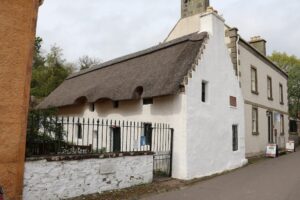
Hugh Miller’s Cottage
Named after a local geologist, palaeontologist and folklorist, Hugh Miller’s Birthplace Cottage and Museum on the Black Isle contains a collection as diverse as Miller’s own interest – ranging from manuscripts to a spinning wheel.
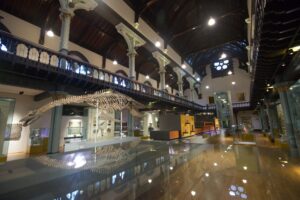
Hunterian, The
At the heart of the University of Glasgow since 1807, The Hunterian is an invaluable academic and community resource. The Hunterian cares for some Scotland’s finest collections that cover subjects as diverse as the history of medicine, archaeology, zoology and art. Its venues include the Hunterian Museum, Hunterian Art Gallery and Mackintosh House. The oldest public museum in Scotland, The Hunterian is at the forefront of university museums around the world.
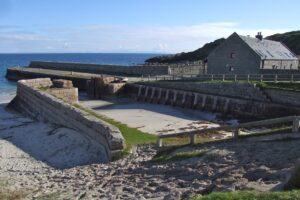
Hynish
Hynish’s collection covers the industrial, nautical, and natural histories of the Isle of Tiree and the Treshnish Isles. The museum is situated in buildings used from the early 19th-century as workshops, a dock and lodgings for workers constructing Skerryvore Lighthouse.
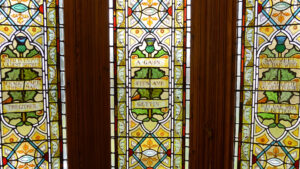
Inglis Memorial Hall Library Visitor Centre
The Inglis Memorial Hall and Visitor Centre in Edzell was gifted by Lieutenant Colonel Robert William Inglis, the son of a local minister, in 1898. The building included Inglis Memorial Hall and Edzell library. Today the Memorial Hall is a busy venue for community groups and the visitor centre showcases the original Victorian library. Visitors can discover how the hall worked and how it served the people of Edzell, and explore an audiovisual presentation featuring the Colonel and his family, the opening of the building, and places to visit in and around Edzell.
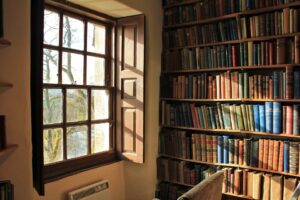
Innerpeffray Library

Insch Connection Museum

Institution of Civil Engineers Scotland Museum
Hosted by Heriot-Watt University, Edinburgh, the museum displays items of civil engineering including items relating to the construction of the Forth bridges. They celebrated their 50th anniversary in 2021.
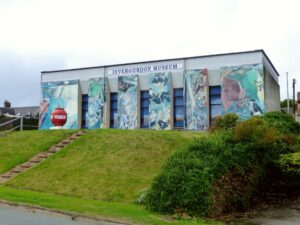
Invergordon Museum
Invergordon Museum highlights the rich maritime heritage of this Highland port town. It features displays on Invergordon’s history as a Naval base, its current role as an oil industry hub, and the sinking of the HMS Natal in the Cromarty Firth in 1915. The museum is also home to an impressive collection of objects from the town’s Naval hospital.
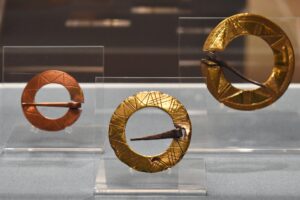
Inverness Museum and Art Gallery
Inverness Museum and Art Gallery explores the history and culture of Inverness and the wider Highlands. Highlights include Jacobite artefacts, a collection of Pictish stones, and a watercolour of Inverness by JMW Turner. Works by artists and makers from across the Highlands are regularly featured in the venue’s dedicated exhibitions space.
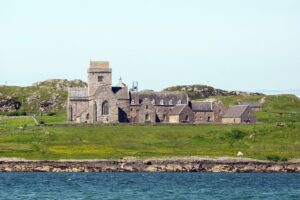
Iona Abbey Museum
Iona Abbey Museum contains a special collections of carved stone crosses, dating all the way back to the 9th Century alongside archaeological artefacts from the island. Located on Iona, the museum is housed beside the abbey, in what was believed to have been the infirmary.

Iona Heritage Centre

Isle of Arran Heritage Museum

James Clerk Maxwell Museum

Jedburgh Abbey
Based in the Scottish Borders, Jedburgh Abbey houses a collection of early Christian artefacts which are older that the Abbey itself. The Abbey was constructed in the 12th century – one of four dating from this period in the Scottish Borders.

Jedburgh Castle Jail and Museum
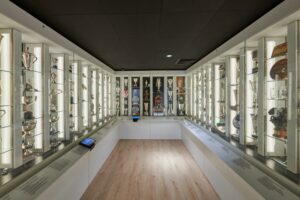
Jim Clark Motorsport Museum
The Jim Clark museum tells the story of Scotland’s first Formula One World Champion- one of the greatest racing drivers of all time. During a career lasting over 11 years, Jim Clark secured double Formula One World Championships, conquered the Indy 500 and won many other races around the world during the 1950s and 60s. This vibrant visitor attraction is a must for motor racing fans and everyone looking for a great day out. As well as viewing many of the trophies that Jim Clark won throughout his career, the museum offers a changing programme of exhibitions and features period cars associated with Jim Clark.

John Buchan Story Museum

John Gray Centre

John Muir’s Birthplace Museum

John Paul Jones Birthplace Museum
John Paul Jones is known as the ‘father’ of the American Navy, but he was born on the banks of the Solway near Arbigland in Dumfries & Galloway. The museum recreates a c. 1700 habitation and also comprises an exhibition about life and exploits of this self-made man.

Johnshaven Heritage Hub Museum
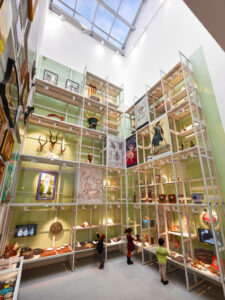
Kelvin Hall
Kelvin Hall is a multi-purpose cultural hub located in Glasgow, Scotland. It provides a platform for the celebration of art and culture, and for creating strong, sustainable communities. The on-site collections store holds items from Glasgow Museums and University of Glasgow and the digital collections of National Library of Scotland can be accessed through the Moving Image Archive.
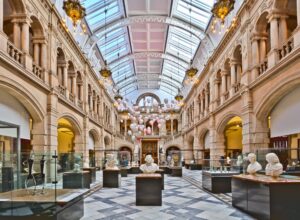
Kelvingrove Art Gallery and Museum
Kelvingrove Art Gallery and Museum is a museum and gallery located in Glasgow, Scotland. It houses an extensive art collection as well as natural history specimens, and artifacts from world cultures, including ancient Egypt, Rome, and the Americas. Kelvingrove is home to renowned artworks, such as Salvador Dali's Christ of Saint John of the Cross, Dora Carrington's Self-Portrait , and Charles Rennie Mackintosh's The Hill House.
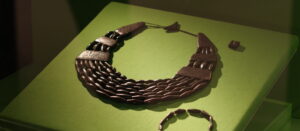
Kilmartin Museum
Kilmartin Museum is located in Kilmartin Glen, Argyll, Scotland. It is known for its collection of prehistoric monuments, such as Neolithic stone circles, chambered cairns, and standing stones. The museum also has many archaeological artifacts from the Bronze and Iron Ages. It is also home to a collection of rock art, featuring carvings of cup and ring marks and other prehistoric symbols.
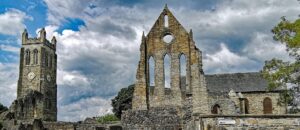
Kilwinning Abbey Tower
Kilwinning Abbey Tower was built in 1816 within the ruins of a 12th-century abbey. The venue is run by volunteers from the Kilwinning Heritage local history group. The Tower includes displays of Masonic items and a locally made longbow from the Ancient Society of Kilwinning Archers. Visitors can learn about the poet Robert Service, also known as the Bard of the Yukon, who once in the village as a child.

King’s Gallery
Opened in 2002, the King's Gallery is situated at the entrance to the Palace of Holyrood house. It houses temporary exhibitions from the Royal Collection.

Kinloch Museum

Kinneil Museum and Roman Fortlet
Kinneil Museum and Roman Fortlet is located on the Kinneil Estate in Bo'ness, only a short walk from the Antonine Wall. The museum serves as an interpretive centre for the whole estate, housing historic artifacts such as Bronze Age and Iron Age tools, Roman coins, and pottery from the nearby ruined fortlet. James Watt’s Cottage can also be found on the estate and is where he developed the first steam engine.

Kinross Museum
Kinross Museum is a local museum located in Kinross. It is dedicated to the history and culture of the area.
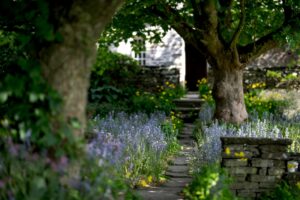
Kirbuster Farm Museum
Kirbuster Farm Museum is an outdoor museum located on Orkney, that allows visitors to explore the traditional way of life on the island. Kirbuster is the last un-restored example of a traditional ‘firehoose’ in Northern Europe and was occupied right up until the 1960s. The farmstead comprises a number of separate buildings detailing the agriculture work undertaken on the island.

Kirkcaldy Galleries
Kirkcaldy Galleries is a arts venue and museum located in the town of Kirkcaldy. The galleries showcase contemporary and historical art, including works by William McTaggart and S.J. Peploe. Kirkcaldy Galleries is also home to an extensive collection of Wemyss Ware, a distinct style of pottery crafted in Scotland during the late 19th and early 20th centuries. The beautiful pieces of Wemyss Ware feature intricate designs and bright, vibrant colours, making them a unique and eye-catching addition to the collection.
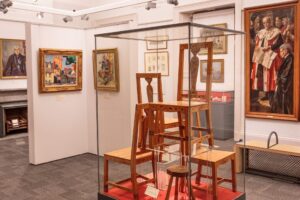
Kirkcudbright Galleries
Kirkcudbright Galleries is situated in Kirkcudbright and has a range of contemporary and historical art exhibitions. The heart of the Galleries is housed in the former Town Hall, a category A listed building, which has been beautifully restored and refurbished to provide a modern art gallery experience. Highlights of the collection include paintings by the Faed family, Charles Oppenheimer and Samuel Peploe.

Kirkcudbright Tolbooth and Art Gallery
Kirkcudbright Tolbooth was originally built around 1625-1629, when it was used as a Town Council meeting place and office, Burgh and Sheriff Court, and the Criminal and Debtor’s prison. Now in the Tolbooth there is an exhibition on the history of the grade A listed building and a gallery showing contemporary art and craft exhibitions by local artists.
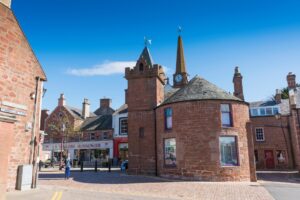
Kirriemuir Gateway to the Glens Museum
Kirriemuir Gateway to the Glens Museum is a local history museum housed in Kirriemuir Townhouse, a former jail and courthouse . The museum houses a permanent exhibition which tells the story of the town from its earliest days to the present day.

Kyle Railway Museum
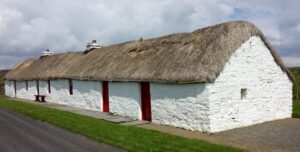
Laidhay Croft Museum
Together with a large display of farming equipment there is a restored, traditional rush-thatched Caithness longhouse set out as a crofters cottage.

Lamb Gallery
Based in the Tower Building at the University of Dundee with a changing programme of exhibitions.

Land, Sea and Islands Visitor Centre
The museum is located within the visitor centre and explores the social, cultural and natural history of Arisaig. There is a section focused on war time as the Special Operations Executive paramilitary training headquarters was based in Arisaig during World War two.

Largs Museum
Largs Museum is housed in some of the oldest buildings in Largs and tells the story of the town.
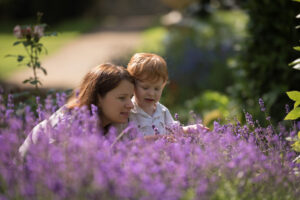
Lauriston Castle
Lauriston Castle is the perfect place to escape from the bustle of the city centre with its calm, tranquil atmosphere, and stunning views across the Firth of Forth. Enjoy a woodland walk, a visit to an award-winning Japanese garden, or step back in time and experience what life was like in an Edinburgh middle-class home at the beginning of the 20th century.

Leadhills Miners Library
Britains oldest subscription library and the world's first library for working people. The collection includes books, archives, and minerals from the local mining industry as well as Library artefacts, which includes the earliest library banner in Britain.

Liddesdale Heritage Centre and Museum
Liddlesdale Heritage Centre and Museum is a local museum dedicated to the history and culture of the area.

Lillie Art Gallery
The Lillie Art Gallery hosts a changing programme of art exhibitions.
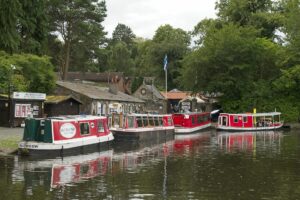
Linlithgow Canal Museum
Linlithgow Canal Museum recounts the history of the Edinburgh and Glasgow Union Canal. On display are tools and equipment from the canals as well as model boats.
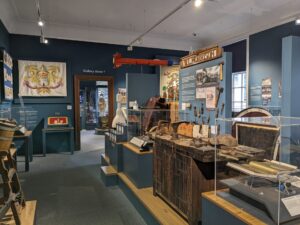
Linlithgow Museum
Linlithgow Museum displays objects relating to the history of the Royal Burgh, including industry, social history and the Linlithgow Marches.
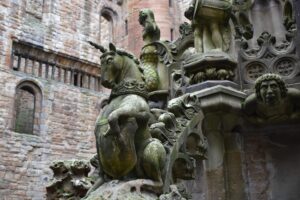
Linlithgow Palace
Set in parkland, the now ruined palace was once a residence of the Stewarts and birthplace of Mary Queen of Scots.

Lismore Gaelic Heritage Centre / Ionad Naomh Moluag
The Centre at the Ionad Naomh Moluag (the gathering place of St Moluag) was opened on 17 March 2007. It comprises an exhibition – with many historic artefacts from the island and information panels about key places to visit, a café, shop and reference library. The building itself is a sustainable eco-museum with grass roof and geo thermal heating. Adjoining the Centre is the award winning Taigh Iseabal Dhaidh a faithfully reconstructed cottar’s cottage which opened in 2002, winning the Place to Visit in Scotland Award. It was also Overall Winner of the UKFX Tourism Awards 2003.
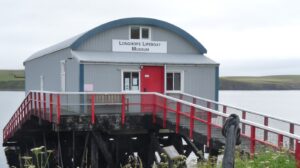
Longhope Lifeboat Museum
Housed within the old lifeboat station Longhope Lifeboat Museum tells the story of the Longhope Lifeboat, the people and the community around it.

Lossiemouth Fisheries and Community Museum
Located on Lossiemouth Harbour the museum tells the story of the local fishing industry.
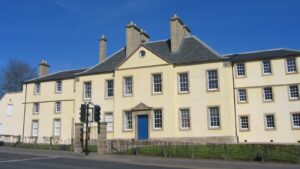
Low Parks Museum
Low Parks Museum displays collections relating to the history, culture and identity of South Lanarkshire. There are also two temporary exhibition galleries which feature changing displays.

Maclaurin Art Gallery
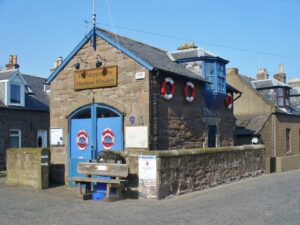
Maggie Law Maritime Museum
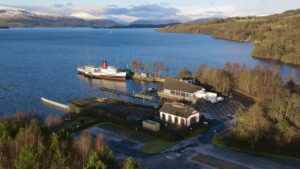
Maid of the Loch and Balloch Steam Slipway

Mallaig Heritage Centre
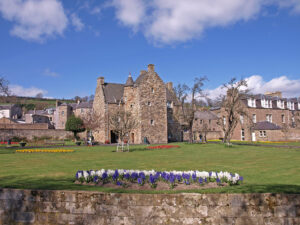
Mary Queen of Scots House and Visitor Centre
Queen Mary's House is a listed sixteenth century building and museum in Jedburgh in the Scottish Borders. It is said that Mary, Queen of Scots, stayed in the building for a short period in 1566. Exhibits recount the life and times of Mary and the history of the building across the ages. To the rear is a large planned garden which is accessible to all; here grow many relatives of the original pear trees planted by monks at the nearby Abbey.
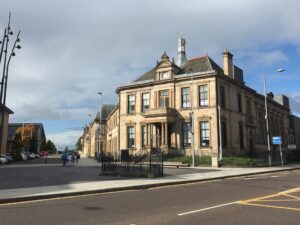
Maryhill Museum
Maryhill Museum’s collection shares the stories of the Burgh Halls and Maryhill Area, including historic and modern examples of stained glass. A community-led organisation, the museum is situated in the regenerated Burgh Halls complex.

Maud Railway Museum
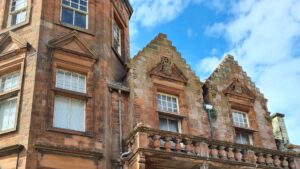
McKechnie Institute
The McKechnie Institute, located in Girvan, South Ayrshire, is a historic building that houses a library, museum, and gallery, serving as a cultural and educational center for the local community and visitors.
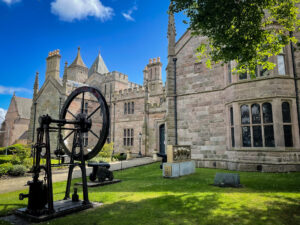
McLean Museum and Art Gallery
Located in Greenock, The McLean Museum and Art Gallery is housed in a 19th-century Gothic revival building. It showcases a diverse collection of local and national history, including artifacts from the first world war, natural history specimens, and art exhibitions featuring works by Scottish and international artists.

McManus Collections Unit
The McManus Collections Unit stores the history, archaeology and natural history collections of Leisure and Culture Dundee. The collections store is not currently open to the public.
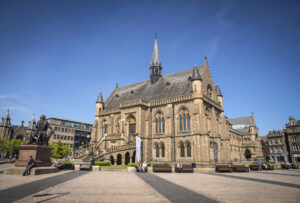
McManus: Dundee’s Art Gallery and Museum, The
McManus: Dundee's Art Gallery and Museum is is home to a wide selection of exhibits that chronicle Dundee's history and culture, including a comprehensive collection of paintings from the 19th century, as well as artifacts from the historic shipyards and jute mills of the city. The building itself is a remarkable example of gothic revival architecture, with ornate ceilings and sculptures, along with a spectacular stained glass window depicting the city's coat of arms.
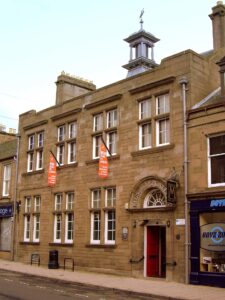
Meffan Museum and Art Gallery
Meffan Museum and Art Gallery showcases a collection of art and artifacts related to the history and heritage of Forfar and the surrounding area. This includes Pictish stones, an exploration of the history of the Forfar witches, and a recreation of The Vennel, a narrow and cobbled street with a sweet shop, knockmaker's workshop, and bakery. The museum’s art gallery showcases the work of local, national and internationally-renowned artists.
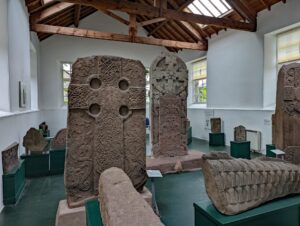
Meigle Sculptured Stone Museum
The Meigle Stone Sculpture Museum is located in the historic village of Meigle, Scotland. It showcases a collection of carved Pictish stones dating back to the early medieval period, housed in a 19th-century former church building.
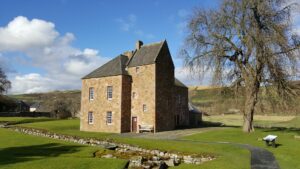
Melrose Abbey Commendator’s House Museum
The Melrose Abbey Commendator's House Museum is located in Melrose, Scotland and is a restored 15th- or 16th-century mansion, situated just North of Melrose Abbey. It showcases the domestic life of the medieval period and houses a collection of artifacts, including furniture, textiles, and ceramics, as well as exhibits about the abbey's history and architecture.

Methil Heritage Centre
The Heritage Centre contains a small display capturing the history of Methil and surrounding area, from prehistoric times to the present day.

Military Museum Scotland
Military museum covering Scottish military history from World War One to present day conflicts. The collection features many different military vehicles and smaller artifacts.

Mill on the Fleet, The
The Mill on the Fleet is a large exhibition centre in a restored 18th century cotton mill. It hosts an annual programme of temporary exhibitions, live music events, talks and festivals throughout the season. Exhibitions uncover the history and heritage of Gatehouse and the River Fleet Valley. The Mill also has a large shop showcasing regional arts and crafts, a large second-hand bookshop, and a café with riverside terrace.
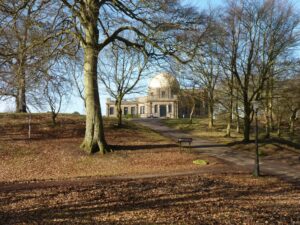
Mills Observatory
Perched atop Balgay Hill in Dundee is the Mills Observatory. When it opened in 1935, it was the UK's first public observatory to be built solely to encourage public understanding of science.

Mintlaw Discovery Centre

Moffat Museum
Originally established in Moffat’s old bakehouse, Moffat Museum reopened in newly refurbished and expanded premises in 2013. It provides an insight into the town’s culture and displays numerous archaeological artefacts and material spanning Moffat’s past. The museum now includes a new space dedicated to the legend and history of Lailoken/Merlin, and is the hub of the Merlin Trail.
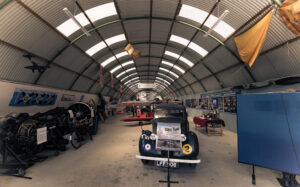
Montrose Air Station Heritage Centre
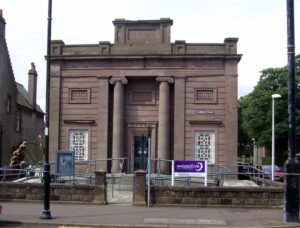
Montrose Museum and Art Gallery
Opened in 1842 by Montrose Natural History and Antiquarian Society, Montrose Museum and Art Gallery tells the story of Montrose and its people, from the earliest archaeological finds to the Marquis of Montrose and the Jacobite uprisings, the harbour and maritime trade. The museum was one of the first purpose-built museums in Scotland and houses its series of displays in the neo-classical building’s spacious atrium, mezzanine and galleries.

Morayvia Aerospace Museum

Mount Stuart
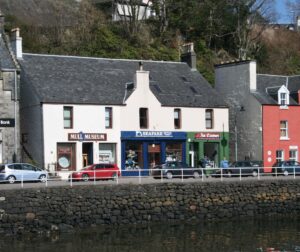
Mull Museum
A small museum crammed with information about the history of Mull and its people - geology, standing stones, castles, Spanish Armada Galleon, crofting, emigrants, schools and World War II Naval base.
Open Easter to October Monday to Saturday 11am to 4pm.
Other times, and library and archive, by appointment.

Mull of Galloway Lighthouse Exhibition
The Mull of Galloway Lighthouse Exhibition is housed in the former fuel store, workshop and engine room. The Lighthouse boasts the only operational foghorn on mainland Scotland, which was originally installed in 1894. The site is co-run by the Mull of Galloway Trust and the Mull of Galloway Experience is operated as a joint venture with Northern Lighthouse Board, RSPB Scotland and Gallie Craig Coffee House. The area around the lighthouse is the smallest RSPB reserve in the country and a designated as a Site of Special Scientific Interest (SSSI).

MUSA Collections Centre
The MUSA Collections Centre is a storage and conservation facility for the University of St Andrews Museum Collections. It houses a wide range of artifacts, including natural history specimens, ethnographic objects, and scientific instruments, as well as fine art, ceramics, textiles, and other cultural objects related to the history and heritage of St Andrews and Scotland.

Museum Collection Centre
The Museum Collection Centre for Museums and Galleries Edinburgh houses the reserve collections, not currently on display at their venues. Public tours can be booked on Tuesdays and Thursdays.
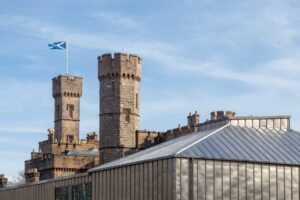
Museum Nan Eilean Lews Castle

Museum Nan Eilean Sgoil Lionacleit
Museum Nan Eilean Sgoil Lionacleit (also known as Museum Nan Eilean U&B) is based in Lionacleit School on the Isle of Benbecula. It is the sister museum of Museum nan Eilean Lews Castle on the Isle of Lewis. The museum displays temporary exhibitions of local art and history.

Museum of Abernethy
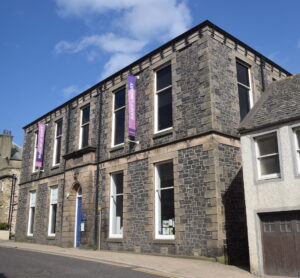
Museum of Banff
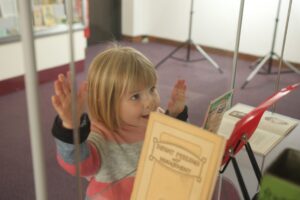
Museum of Childhood
Opened in 1955, The Museum of Childhood was the first ever museum dedicated to British childhood experiences. It explores the lives in children at home, at school, and at play. The collection dates from the 1800s to present day and features toys, games, dolls, fancy dress, items relating to hobbies and pastimes, books, magazines and comics.

Museum of Communication

Museum of Edinburgh
The Museum of Edinburgh is located on the Royal Mile and had a large selection of stories, objects and discover more about Edinburgh's incredible 16th century buildings.
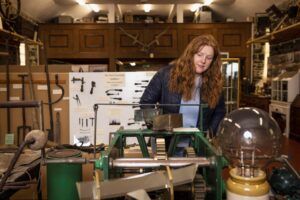
Museum of Islay Life
The museum houses a large collection of objects, books, and stories illustrating life on Islay. Over 3000 items, from archaeological material, a large photographic collection, and the Gordon Booth library - a collection of books, papers and records of the island – are all housed within the former Kilchoman Free Church in Port Charlotte.

Museum of Lead Mining/ Hidden Treasures
The Museum is situated in Wanlockhead, the highest village in Scotland. The surrounding Lowther Hills contain iron ore deposits and here a lead mine was set up in the eighteenth century. The site comprises miners cottages spanning a period of habitation from 1750 – 1910, as well as the lead mine itself with its subterranean tours – unique in Scotland. There is also a Miners’ Library, one of three subscription libraries in Scotland set up by the miners themselves. The displays consist of minerals, gold, mining and local artefacts in the Visitor Centre, as well as a gift shop and tearoom.

Museum of Piping
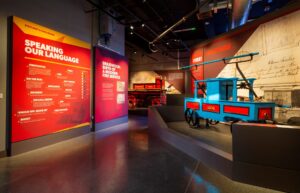
Museum of Scottish Fire Heritage
The Museum of Scottish Fire Heritage features equipment, uniforms, and appliances which showcase the history of firefighting. It includes displays ranging from the birth of the fire service to what it takes to be a modern firefighter.
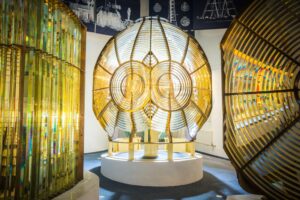
Museum of Scottish Lighthouses
The Museum of Scottish Lighthouses is a purpose-built museum situated next to Kinnaird Head Lighthouse, which was constructed through the middle of a 16th-century castle as the first lighthouse on mainland Scotland. The museum explores life-saving engineering, the story of the Northern Lighthouse Board, and the lives of the people connected to it.
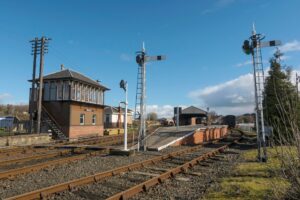
Museum of Scottish Railways
The Museum of Scottish Railways at Bo’ness showcases the history of railways in Scotland. The collection has a significant object and archive collection related to railways, including vehicles. In the museum there are interactive displays, a vehicle display shed, and an engineering workshop viewing gallery.
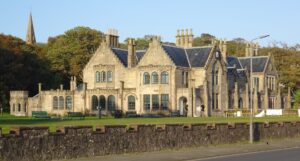
Museum of the Cumbraes
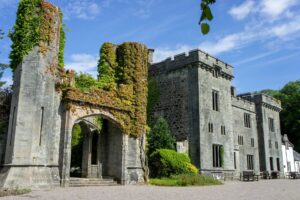
Museum of the Isles
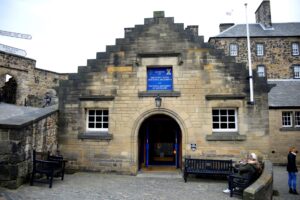
Museum of the Royal Regiment of Scotland
The Museum of the Royal Regiment of Scotland, a regiment formed in 2006, is currently co-located with The Royal Scots Museum in Edinburgh Castle. There are over 750 objects in its collection from uniforms, equipment and weapons to documents, artwork, and insignia.

Musselburgh Museum
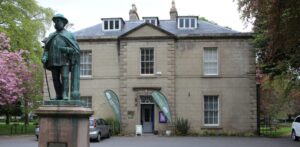
Nairn Museum
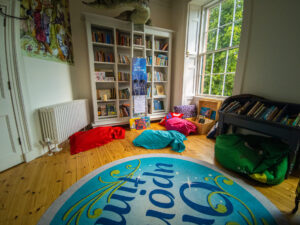
National Centre for Children’s Literature and Storytelling
Moat Brae in Dumfries was one of the childhood haunts of playwright and author of ‘Peter Pan’, JM Barrie. He lived in Dumfries from 1873 to 1878 and went to Dumfries Academy. He would later say that the gardens at Moat Brae were ‘enchanted lands’ to him and inspired the world of Peter Pan. Today, Moat Brae is known as the National Centre for Children's Literature and Storytelling and comprises interactive exhibits, libraries, play-rooms and educational suites that inspire reading and creativity.
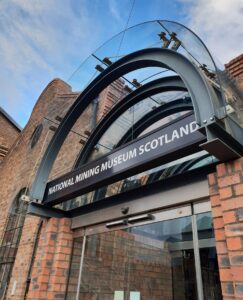
National Mining Museum Scotland
The National Mining Museum Scotland is home to one of the best-preserved Victorian Collieries in Europe and the national coal mining collections. The museum tells the story of coal mining in Scotland and has a collection of over 100,000 items, which help show the social, economic, political, and cultural impact of the industry, miners, and their communities on Scotland.
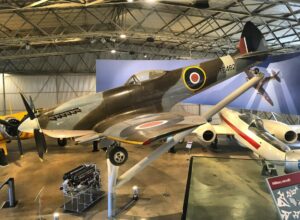
National Museum of Flight
The National Museum of Flight is located at East Fortune Airfield in East Lothian. It houses a vast collection of aircraft and aviation artefacts including a Concorde G-BOAA, a Supermarine Spitfire, and a Red Arrows Hawk T.1A. The museum has a range of indoor and outdoor displays, a flight simulator, and interactive trails.
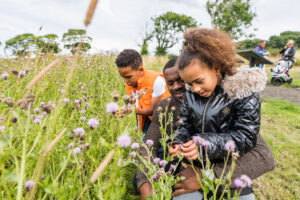
National Museum of Rural Life
The National Museum of Rural Life in East Kilbride is housed in a restored working farm showcasing rural life from the mid-20th century. It features a collection of agricultural equipment, tools, and machinery, as well as exhibitions about the history of rural Scotland, the life of farmers and their families, and the development of modern agriculture.
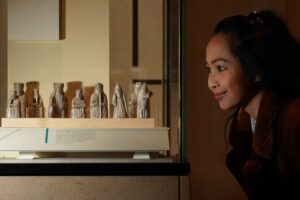
National Museum of Scotland
The National Museum of Scotland opened in 1866 and has since become a popular destination for locals and tourists. It houses a wide array of artifacts and exhibits, ranging from ancient civilizations to modern-day technologies.
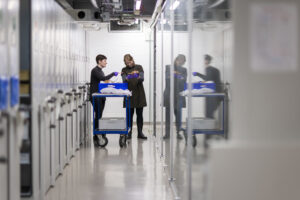
National Museums Collection Centre
The National Museums Collection Centre in Edinburgh is a purpose-built storage facility for the National Museums Scotland's collections. It houses over 4 million objects, including archaeological artifacts, fine art, natural history specimens, and industrial and scientific objects, that are not on display at the organization's public museums.
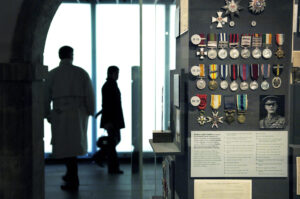
National War Museum
The National War Museum is located within Edinburgh Castle and showcases the military history of Scotland from the 17th century to the present day. It features a collection of weapons, uniforms, medals, and other military artifacts, as well as interactive displays and exhibitions about key events and individuals in Scottish military history.

Natural History Collections University of Edinburgh
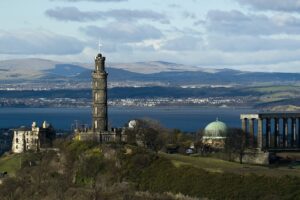
Nelson Monument

Ness Heritage Centre
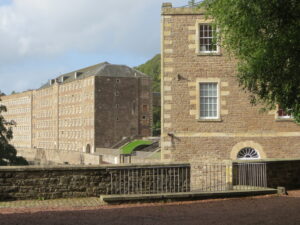
New Lanark Visitor Centre

Newburgh Heritage Centre

Newport Heritage Centre
Newport Heritage Centre have a range of objects and photographs that depict the history of Newport and Wormit these items have been integrated within the Newport Library to create a cultural hub for Newport residents and visitors.

Newton Stewart Museum
This volunteer run museum is housed in the former church of St John in the small town of Newton Stewart, Galloway. It is packed with curiosities and historical treasures, with much of the collection recounting life in the region from the Victorian period onwards. Natural and social history collections are organised across thematic sections with include the Nursery, Tradesman's Tools, Dairy, Kitchen, the Smithy, Textiles, and Photography.

North Ayrshire Heritage Centre
North Ayrshire Heritage Centre is located in a 18th century former parish church. It houses North Ayrshire Council’s principal museum collection, which contains archaeology, social, domestic, military and natural history, fine art, and costume. It includes a stone sarcophagus which is thought to be one of the finest examples of Scottish medieval sculpture.

North Coast Visitor Centre
North Coast Visitor Centre is located in the former Thurso Town Hall. The collection tells the story of Caithness from the Devonian geological period to the present day. Exhibitions include locally unearthed Pictish artefacts and the history of Dounreay, and it’s impact on Caithness culturally and socially.

North Lanarkshire Heritage Centre
North Lanarkshire Heritage Centre houses North Lanarkshire’s Archives collections and has a temporary programme of exhibitions, events, and activities. There is also local and family history advice and guidance.

Nurse’s Cottage Heritage Centre

Oban War and Peace Museum
Located on the ground floor of the Old Oban Times Building, this volunteer run museum has a collection covering the history of the port town, highlighting the strategic role played by Oban during the war years.

Old Bridge House Museum
The Old Bridge House was built in 1660 on the western side of the medieval Devorgilla Bridge that crosses the River Nith in Dumfries. It is the towns oldest house, and was once the home of Granny Black – a local woman, nicknamed the Matriarch of Maxwelltown – who lived in the upper rooms of the house for over 50 years. The House now contains displays of historic artefacts that illustrate everyday life in the town, including the materials and dentistry tools of Herbert Dykes. A family kitchen, nursery and bedroom of a Victorian home are also recreated.

Old Gala House Museum
Old Gala House was once home to the Lairds of Galashiels and dates back to 1583. Now as a museum and gallery it tells the story of the town and its people along with a programme of temporary exhibitions and events.
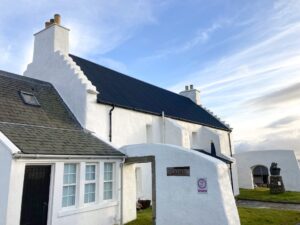
Old Haa Museum
The Old Haa is a museum, garden and tearoom in the island of Yell in Shetland. The museum has a collection of historic objects, and an archive alongside a programme of temporary exhibitions on contemporary arts and crafts. The archive has a large sound and photographic collection, including over 16,000 images.

Orkney Fossil and Heritage Centre
Orkney Fossil and Heritage Centre highlights the region's rich natural and cultural heritage. Visitors can learn about the geological and archaeological history of the Orkney Islands and view a wide range of fossils, artefacts and other displays going back 350 million years.
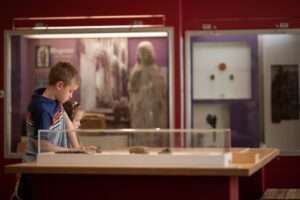
Orkney Museum
Orkney Museum showcases the history, culture and people of the Orkney Islands from the Stone Age, to the Picts and Vikings. The museum offers interactive activities and exhibitions to visitors, as well as hosting events throughout the year. The museum also houses a wide range of artefacts, including archaeological finds, historical documents and photographs.
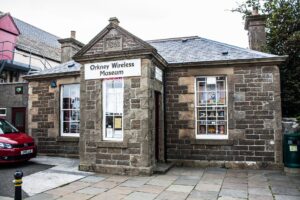
Orkney Wireless Museum
The Orkney Wireless Museum is ran by volunteers and is dedicated to preserving the history of wireless communication in Orkney. The museum houses an extensive collection of wireless equipment and artefacts from the 20th century. Visitors to the museum can learn about the history of wireless communication, explore the displays of antique equipment, and view demonstrations of how wireless communication worked in the past.

Paisley Thread Mill Museum
Paisley Thread Mill Museum celebrates the rich cultural heritage of Paisley and its former thread-making industry. Visitors to the museum can explore the history of the thread industry and learn about the lives of the workers who operated the mill through displays and interactive digital image & video archives.
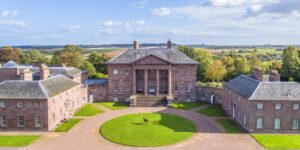
Paxton House
Paxton House is a Georgian manor set in 80 acres of landscaped grounds on the banks of the River Tweed. The house has permanent and temporary exhibitions, a tearoom, a Recognised furniture collection, and a Regency-era Picture Gallery which displays masterpieces on loan from National Galleries of Scotland. Paxton house also runs guided tours, events, and an education programme.

Peebles Museum and Gallery
Peebles Library, Museum & Gallery is located in a 16th century building. Inside the Chambers Room houses plasterwork friezes including a 16-metre reproduction of a section of the Parthenon Frieze. The museum highlights the history of the area, from a medieval pilgrimage destination to the importance of the local woollen mills in the 19th and 20th centuries. There are also temporary history, craft, and art exhibitions.

Penicuik’s Paper Heritage Museum
Penicuik Papermaking Heritage Museum is a volunteer run museum which celebrates the history of Penicuik ‘The Papermaking Town’. There is a collection of artefacts from the papermills and displays which tell the story of papermaking in Penicuik and role of Penicuik’s papermakers. Visitors can have a hands-on experience of making a sheet of paper.
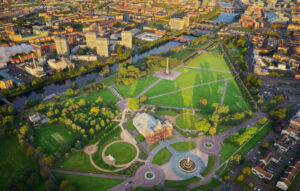
People’s Palace, The
The People's Palace is a social history museum. It houses an extensive collection of artefacts, documents, and photographs that tell the story of the people of Glasgow, including symbolic banners that portray the history of working-class struggle in the city, regarded as the birthplace of trade unionism in Scotland.

People’s Story Museum
The People's Story Museum focuses on the history of Edinburgh's working class people from the 18th century to the late 20th century. History, culture, crafts and trades, and the people of Edinburgh are highlighted through the museum. It is also a place for visitors to explore contemporary issues, events and opinions.
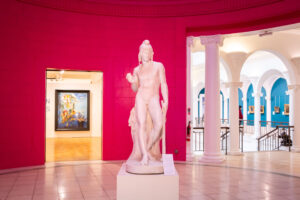
Perth Art Gallery
Perth Art Gallery focuses on modern Scots, a story which is told through the development of art and design in the region up to the present day. Works of art from local, Scottish, and international artists are displayed and it will soon become the new home to the Fergusson Collection.
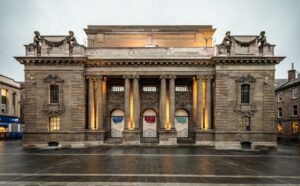
Perth Museum
Perth Museum is housed in a heritage Edwardian building that once served as a gathering place hosting everything from markets and concerts to political conferences and wrestling matches. The Museum displays Perth & Kinross’s Recognised Collections of National Significance as well as iconic loans and exhibitions from the UK and abroad.

Peterhead Prison Museum
Peterhead Prison Museum is located in the former Victorian HM Convict Prison Peterhead. It tells the story of the prison and the people connected to it. An audio tour and recreated sections of the prison bring it to life for visitors.

Physicians’ Gallery
The Physicians' Hall in Edinburgh houses the Royal College of Physicians of Edinburgh's art collection, known as the Physicians' Gallery. The museum features a collection of paintings, drawings, and other artworks, many of which were created by prominent Scottish artists, as well as historical objects and artifacts related to the history of medicine and the college itself.

Pier Arts Centre
Opened in 1979, the Pier Arts Centre was set up as a home for an important collection of British fine art donated by Margaret Gardiner (1904-2005). The permanent collection is regarded as one of the finest of the period.

Pitlochry and Moulin Heritage Centre
Pitlochry and Moulin Heritage Centre, situated within Moulin Kirk, displays exhibitions of local history including historical photographs of the local area. Many collection items have been donated or loaned by residents local to the area.
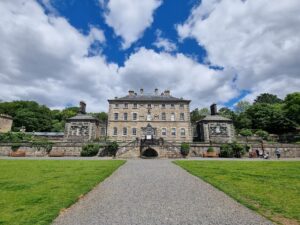
Pollok House

Portsoy Salmon Bothy

Prestongrange Museum
Prestongrange Museum houses monumental relics of Scotland's industrial heritage, including remains of a harbour, glass works, pottery, colliery and brickworks. Visitors can explore the site and see the relics, including a vast brick kiln and a Cornish beam engine.
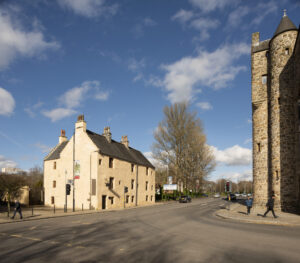
Provand’s Lordship
Provand’s Lordship was built in 1471 and is one of only four surviving medieval buildings in Glasgow. The museum is a rare example of 15th-century domestic Scottish architecture and the rooms are furnished with period furniture and objects.
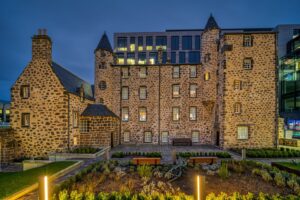
Provost Skene’s House
Built in 1545, Provost Skene's House is the oldest surviving townhouse in Aberdeen. The house has a fascinating history and became a museum in 1953. It now celebrates the lives of over 100 people from Aberdeen and the North-East via interactive displays, including innovators, scientists, writers and stars of stage and screen.

Queensferry Museum
Queensferry Museum is located on the historic high street of South Queensferry; an attractive small town beneath the Forth Rail Bridge, and part of he City of Edinburgh. The museum is managed by Museums & Galleries Edinburgh, and houses collections linked to te Forth Rail Bridge and Queensferry, including the Burryman suit.

R & A World Golf Museum
Located opposite the Royal and Ancient Clubhouse, the R&A World Golf Museum explores the origins of golf in Scotland and looks at how it became a worldwide pastime. The exhibits cover all aspects of the game from fashion and equipment to its champions.

Ravenspoint Museum
A small museum based in the Ravenspoint Visitor Centre telling the history of the area and its people.

Renfrew Community Museum
Renfrew Museum explores the history of the area from medieval times to the present day. The museum is set around four themes of Earth, Fire, Air and Water each focussed on a different area of Renfrew's story.

River Findhorn Heritage Centre
The River Findhorn Heritage Centre explores the area around the River Findhorn – looking at the history of crofting and geology of the area as well as the more gruesome stories of Randolph’s Leap and the Wolf of Badenoch.
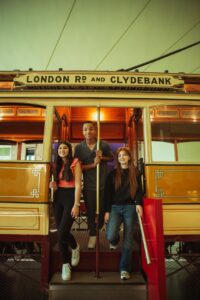
Riverside Museum
Based on the banks of the Clyde, Riverside Museum displays a vast array of transport and technology collections with lots of interactive exhibits.
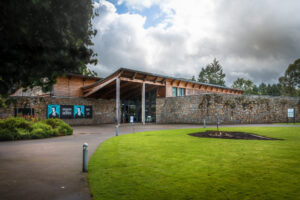
Robert Burns Birthplace Museum
At The Robert Burns Birthplace Museum you can visit the cottage where Burns was born, then explore the museum which holds many objects relating to the Bard's life and career. See manuscripts, early editions of his works, and a cast of Burns' skull.

Robert Burns Centre
The Robert Burns Centre is situated in an eighteenth century watermill by the banks of the River Nith in Dumfries. An interactive exhibition tells the story of the Bard's time in the market town, drawing upon historic collections of manuscripts and personal affects. A scale model of Dumfries in the 1790s can also be viewed, as well as audio-visual presentations. The building is also a community hub and cinema.
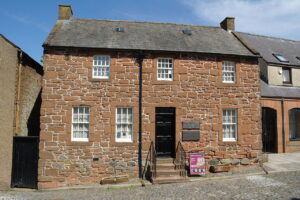
Robert Burns House
This sandstone house was where Robert Burns lived from 1793 to his death in 1796. The building is presented as it would have looked during the poets time, and the displays reflect family life, Robert’s role as an exiseman, and the life of Jean Armour and her relatives. Original objects belonging to Burns and Armour are displayed, including notebooks and personal effects. Burns’ autograph is scratched with a diamond stylus on an upstairs window pane.

Robert Gordon University Art & Heritage Collections
Robert Gordon University Art & Heritage Collections consists of historical objects and contemporary art which highlights the University’s history. There is also a programme of temporary exhibitions, events, and activities.

Ross of Mull Historical Centre
The Ross of Mull Historical Centre preserves the history and culture of the Ross of Mull area. Visitors can explore the area's past through photographs and artefacts highlighting the local geology, flora and fauna, and industries such as fishing, crofting, and mining.
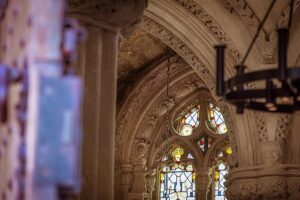
Rosslyn Chapel
Rosslyn Chapel is a 15th-century chapel that is famous for its intricate stonework, carvings, and legends of hidden secrets. The chapel is an architectural masterpiece, with a unique style that features intricate stonework and carved figures of angels, saints, and knights. Visitors can tour the chapel.

Royal Burgh of Lanark Museum
Lanark Museum highlights through their exhibitions and collection the ancient and varied history of Lanark. The town is one of Scotland's oldest burghs, and from the time of King William the Lion was a favoured hunting area of the Kings of Scotland.

Royal College of Physicians and Surgeons Glasgow
The Royal College of Physicians and Surgeons of Glasgow was founded in 1599 and its heritage collections span over 6 centuries. The collections include thousands of medical and surgical instruments, rare books, archives, and pictures to support exploring the history of medicine and Glasgow. Many items in the collections have been digitised.

Royal Scots Dragoon Guards Museum
The Royal Scots Dragoon Guards Museum is located in Edinburgh Castle and tells the story of the British regiment dating back to the late 17th century to the present day. The museum offers a unique insight into the regiment's history and its role in important events. Visitors can explore the regiment's past through a range of exhibits, including uniforms and weapons.

Royal Scots Regimental Museum
The Royal Scots Regimental Museum tells the story of one of the oldest regiments in the British Army. It is located in Edinburgh Castle and provides an insight into the history of the regiment and its people. Visitors can explore the collection of artefacts and documents relating to the regiment, as well as the uniforms, weapons and medals of the Royal Scots.

Royal Scottish Academy of Art & Architecture
The Royal Scottish Academy of Art & Architecture (RSA) promotes and supports the creation, understanding, and enjoyment of the visual arts in Scotland. The RSA holds exhibitions, awards, scholarships, residencies, and educational programmes. Their collection is made up of works from Scottish artists and architects of the last 200 years. It includes entire artists’ estates with everything from sketchbooks to finished paintings and sculptures, alongside memorabilia, archives and personal libraries.
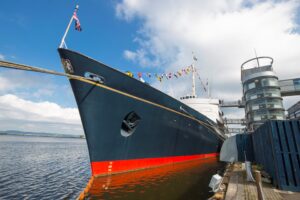
Royal Yacht Britannia
The Royal Yacht Britannia is a former royal yacht of the British Royal Family, launched in 1953. During its 44 years of service, it travelled over a million nautical miles around the world, serving as a floating royal residence for Queen Elizabeth II and other members of the British Royal Family. It is now permanently moored in Edinburgh and open to the public for tours.
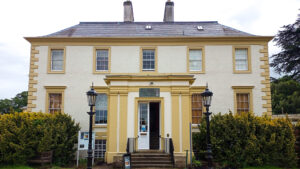
Rozelle House Galleries
Rozelle House Museum and Galleries in Ayr displays items and artworks from the South Ayrshire Council collection. This includes Alexander Goudie's narrative cycle of 54 paintings inspired by Robert Burns' famous poem 'Tam o' Shanter'. The museum also hosts the Ayrshire Yeomanry Museum, which tells the story of their history. There is a changing programme of exhibitions, events, and activities.

Sanday Heritage Centre
Sanday Heritage Centre celebrates and explores the history of the island. It aims to provide a learning and research centre for local history and culture, and to promote the island's cultural heritage. The Centre includes an archive and close to it is the Croft (a restored but'n'ben house), and the reconstruction of the burnt mound excavated at Meur.
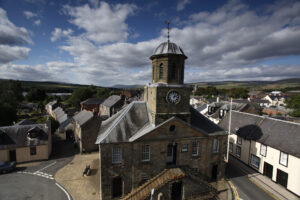
Sanquhar Tollbooth Museum
Housed in the impressive Tolbooth at the top of the High Street, the museum contains collections relating to local living heritage and craft traditions (Sanquhar Knitting, Riding the Marches), art by local painters, artefacts relating to mines and mining in Sanquhar and Kirkconnel, and information about those imprisoned at the Tolbooth as well as the cell itself beneath the building.

Scalloway Museum
Scalloway Museum holds exhibitions and events about the history of Scalloway and its people. Its collection includes archaeological artefacts, local paintings and photographs, and a range of historic objects and documents. The museum highlights ‘The Shetland Bus’ – the nickname given to operations carried out from Shetland to occupied Norway during World War 2.
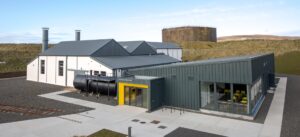
Scapa Flow Museum
Scapa Flow Museum highlights Orkney’s military involvement in the First and Second World Wars. The museum features a large collection of wartime artefacts and displays, many of national and international importance.
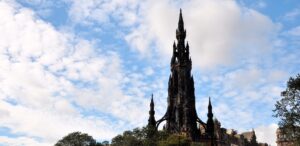
Scott Monument
The Scott Monument is dedicated to Sir Walter Scott and was designed by George Meikle Kemp. It includes a museum room, which shares the monument's history and legacy and there are also tour guides to assist visitors.
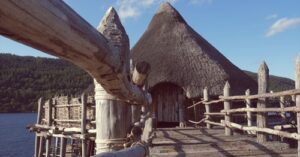
Scottish Crannog Centre
The Scottish Crannog Centre is a living history museum located on the banks of Loch Tay. It shares and highlight the lives of Crannog dwellers who lived on the Loch 2,500 years ago. The museum exhibits artefacts from the Crannog dwellers, has hands on demonstrations, and provides guided tours.

Scottish Fire and Rescue Service Museum and Heritage Centre
The Scottish Fire and Rescue Heritage Museum in Greenock is dedicated to the history of Scotland's fire and rescue service. It’s located on the site of the former Greenock Fire Station, and houses a wide range of artefacts and stories from the service's long history with displays on the history of firefighting, the development of fire safety in Scotland, and the history of the building.
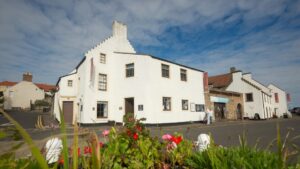
Scottish Fisheries Museum
The Scottish Fisheries Museum is dedicated to preserving the history, culture and heritage of Scotland's fishing industry and the people who worked in it. The museum is located near the historic harbour of Anstruther and has interactive exhibits and displays, including a recreated fisherman's cottage, traditional boats, and a variety of artefacts and photographs from the earliest days of fishing in Scotland to the future of the industry.

Scottish Football Museum
The Scottish Football Museum has a national collection of over 40,000 items of football memorabilia, spanning over 140 years of the sport's history in Scotland. Housed within Hampden Park, the museum tells the story of Scotland's national game, from its earliest beginnings right up to the present day, through items such as the jersey and gloves worn by David Marshall during Scotland’s qualifier for Euro 2020.
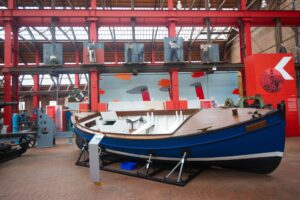
Scottish Maritime Museum Irvine
The Scottish Maritime Museum, located in Irvine is home to the national collection of Scotland's maritime history. It offers visitors an insight into the nation's maritime past, from its beginnings as a fishing nation to its place in the global maritime trade. The museum holds a wide range of maritime related artefacts, from ships and boats to instruments, tools and documents.

Scottish Mask and Puppet Centre
The Scottish Mask and Puppet Centre Museum is dedicated to the history, preservation, and promotion of masks and puppetry. The Centre houses an extensive collection of masks and puppets from around the world, as well as displays of masks used in traditional and modern performances. The Centre also offers educational programs, workshops, and events.
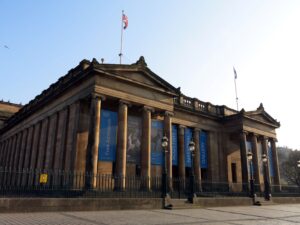
Scottish National Gallery
The Scottish National Gallery houses Scotland's national collection of fine art, spanning from the early Renaissance to the present day. The galleries hold an extensive collection of paintings with works by internationally renowned artists and a significant collection of Scottish art from the Renaissance to the present day.
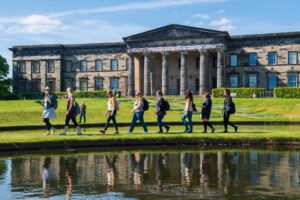
Scottish National Gallery of Modern Art: Modern One
Modern One, part of the Scottish National Gallery of Modern Art is set in a sculpture park. The collection includes sculptures by artists such as Joan Miró, Rachel Whiteread and Barbara Hepworth, art ranging from the 1900s to the present day, and a world-famous collection of Surrealism and Dada.

Scottish National Gallery of Modern Art: Modern Two
Modern Two, part of the Scottish National Gallery of Modern Art is set in a sculpture park. It’s home to The Stairwell Project by Turner Prize- winner Richard Wright and also a detailed recreation of Eduard Paolozzi's studio. There is also a temporary exhibition programme.
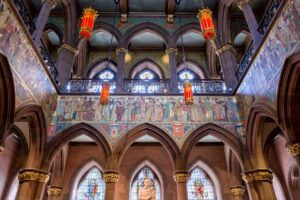
Scottish National Portrait Gallery
The Scottish National Portrait Gallery was established in 1889 and houses a collection of portraits of Scots, from the 16th century to the present day, featuring works by some of Scotland's renowned artists. Visitors can explore the history and culture of Scotland through the portraits and learn more about the country and its people.
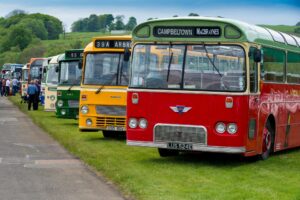
Scottish Vintage Bus Museum
The Scottish Vintage Bus Museum is a museum dedicated to preserving and showcasing over 100 of Scotland's vintage buses, trains, and a horse tram. The museum houses a collection of buses from all over Scotland, from the earliest models to the latest. They also offer guided tours and activities for children.

Session Cottage Museum
The Session Cottage in Turriff is ran by the Turriff and District Heritage Society and open during the summer months. It has been preserved as a traditional 'but and ben' (two room) cottage from 1900.

Shetland Crofthouse Museum
The Shetland Crofthouse Museum, located in the Shetland Islands, is a historic building presented in the style of how it would have looked in the 1870s. It has been carefully preserved to represent a traditional Shetland croft house, with traditional artefacts, furniture, and tools to help tell the story of the people who lived there . Museum custodians are also on hand tell the story of crofting in Shetland over the past century.
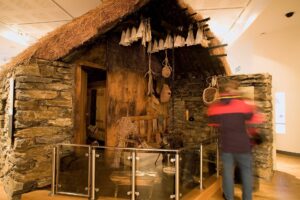
Shetland Museum and Archives
Shetland Museum and Archives is dedicated to the preservation, research, and interpretation of the region's history, culture and environment. The museum offers a wide range of exhibitions and activities, from a permanent display on the history of Shetland to temporary exhibitions on topics such as art and archaeology. The museum also houses an archive with resources related to Shetland's past and present.

Shetland Textile Museum
The Shetland Textile Museum celebrates the history of textiles and the craftsmanship of Shetland knitters. Visitors to the museum can explore the exhibits that showcase the unique, intricate patterns and techniques used by Shetland knitters, as well as the history of the craft itself. The museum also offers interactive activities such as weaving and knitting classes, as well as workshops and special events throughout the year.

Sir Walter Scott’s Courtroom
Sir Walter Scott's Courtroom is an interactive museum located in Selkirk, Scottish Borders. It is housed in the original courtroom where Sir Walter Scott sat as Sheriff of Selkirkshire. Visitors to the museum can explore the courtroom and its history, as well as listen to court cases, and explore the courtroom's collection of artefacts. The museum also offers educational programs and special events, such as re-enactments of court cases and historical tours.
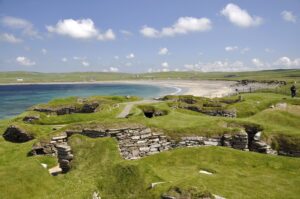
Skara Brae Visitor Centre
Skara Brae Visitor Centre is located on the Orkney Islands. The site is home to the oldest intact stone-built village in Europe, dating back 5000 yeas ago. Visitors can explore the Neolithic village and surrounding landscape, discover the history of the site, and learn about the people who lived there. The Centre also offers a range of interactive activities, such as guided tours, an audio-visual experience, and activities for younger visitors.

Skelmorlie Secret Bunker
Skelmorlie is a Royal Observer Corps underground monitoring post used during the Cold War. It’s fully restored and visitors can tour it with a member of 25 Group (Ayr) Royal Observer Corps Association who served in the Corps and at Skelmorlie.

Sma’ Shot Cottages
Sma' Shot Cottages preserves and shares Paisley's cultural heritage. Visitors can tour the weaver's cottages, built in the 1750s and learn about the history of the paisley pattern.

Smailholm Tower
Smailholm Tower inspired Sir Walter Scott when he lived there. Visitors can tour the tower, including viewing the completeness of the 15th-century laird’s residence and see the Minstrelsy of the Scottish Border exhibition.

St Andrews Cathedral Museum
St Andrews Cathedral is Scotland’s largest medieval church. It’s cared for by Historic Environment Scotland. The museum for the cathedral shares information on the site, which was used for worship since at least the 700s. Visitors can view displays on early and later medieval sculpture and other relics found on the site.

St Andrews Heritage Museum and Garden
St Andrews Heritage Museum and Garden is located in a 17th century house and garden, which is the oldest settlement of St Andrews and one of the earliest domestic dwellings in the area. The museum shares the story of the town and its people through objects that reflect social, working, and domestic life in St Andrews. The garden is designed to be sensory and visitors can see exhibitions and installations throughout it.

St Andrews Museum
St Andrews Museum is located in a Victorian mansion in the grounds of Kinburn Park. It tells the story of St Andrews and the people who have lived there. It has an art collection, temporary exhibitions, and a regular programme of events and activities.

St Cecilia’s Hall Museum of Instruments University of Edinburgh
St Cecilia's Hall was built by the Edinburgh Musical Society in 1762 and is Scotland's oldest purpose-built concert hall. Now it comprises of a Concert Room and a Music Museum, showcasing the University of Edinburgh’s 6,000+ collection of musical instruments. The museum contains a dedicated space for conserving instruments, which is visible to visitors, and more than 400 instruments have been treated.

St Mungo Museum of Religious Life and Art
St Mungo Museum of Religious Life and Art is located on the site of the medieval Bishops’ Castle and is built in its style. The collection of objects and art focuses on religion and its connection to peoples’ lives across the world and history. The museum promotes understanding and respect between people of different faiths and those of none. There are also regular events and the first Zen garden in Britain.

St Vigeans Museum
See in a single place the 38 Pictish stones found in this Angus village. St Vigeans was likely an important Pictish religious centre, judging by the number and quality of the Pictish Christian carvings.

St. Ronan’s Wells Visitor Centre
St. Ronan's Wells Visitor Centre tells the story of the town and popular spa that has a sulphurous spring, which helped people with their ailments. There is information about the town’s connections to James Hogg and Sir Walter Scott and items on display from the St. Ronan’s Border Games and Cleikum Ceremonies.

Stanley Mills
Stanley Mills is a well preserved mill with a 200 year history starting in the Industrial Revolution ending in 1989 when it closed. Visitors can explore the mills and interactive displays to gain an insight into the industrial and social history of the factory and people who worked there.

Stewarton Museum
Stewarton Museum is a local history museum ran by volunteers. It has a collection of written articles, books, artefacts, photographs, paintings, maps and computer records relating to the local area and the people who lived there. The museum supports research and family tree enquiries.

Stewartry Museum
Stewartry Museum showcases objects relating to the area called The Stewartry, or Kirkcudbrightshire. The museum has a local history library and archive collection, and an extensive photographic archive, which can be accessed by visitors. There is also a temporary exhibitions programme, specials events, and children’s activities.
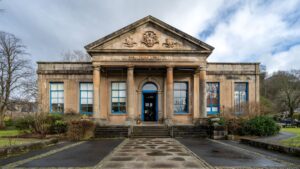
Stirling Smith Art Gallery
The Stirling Smith Art Gallery & Museum was created from the bequest and collection of the artist Thomas Stuart Smith. It was founded in 1874. Their art collection includes works by Anne Redpath, William Gillies, and William MacTaggar. The museum also highlights the local history of Stirling through a focus on the social and natural history of the area. There is also a temporary exhibition programme.

Stornoway Historical Centre
The Stornoway Historical Centre was made to create awareness to the general public of the town’s early and most recent history. This is done through their exhibitions, public lectures, and publications lead by The Stornoway Historical Society which formed in 1992.
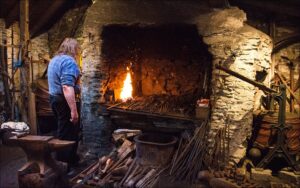
Strachur Smiddy Museum and Craft Shop
The Strachur Smiddy is a working 18th-century blacksmith’s smiddy which has been restored to its original state. Each weekend, there are demonstrations which give visitors an opportunity to work the forge bellows. The museum reflects the Smiddy’s part in Strachur’s history and highlights historic Scottish rural life, while the shop sells a range of local crafts and gifts.

Stranraer Museum
Stranraer Museum is located in the Old Town Hall, built in 1776. The museum showcases Wigtownshire's past, including Victorian Wigtownshire through 3D photographs. The collection includes archaeology, local history, costume, farming and dairying, and one of Scotland's oldest ploughs. There is also a temporary exhibition programme.

Strathaven Museum

Strathnaver Museum
Strathnaver Museum is based in the former Parish Church of Columba in Bettyhill, an important building to the history of the Highland Clearances. The museum tells the social history of the area including the Highland Clearances, the Clan Mackay, Gàidhlig Dhùthaich ’ic Aoidh, and crofting life. It also has a range of temporary exhibitions.
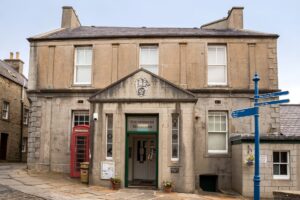
Stromness Museum
Stromness Museum is one of Scotland's oldest independent museums, founded in 1837. Their collection focuses on the social history of Stromness and Orkney and natural science, including maritime and natural history. They hold temporary exhibitions alongside their permanent galleries and host regular events.
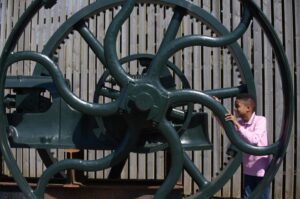
Summerlee Museum of Industrial Life
Summerlee Museum of Scottish Industrial life tells the industrial and social history of Lanarkshire. The museum was built on the site of the Victorian Summerlee Iron Works and the former Hydrocon Crane factory. It has Scotland’s only working heritage tramway, a restored section of the Monklands Canal, a re-constructed traditional 'Miners Row', and a recreated mine. There are also changing temporary exhibitions.
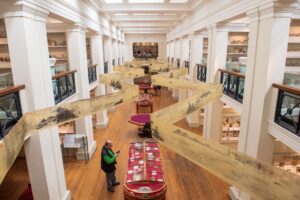
Surgeon’s Hall Museum
Surgeons' Hall Museums were originally created as a teaching resource for students of medicine, but they’ve been open to the public since 1832. They’re one of Scotland’s oldest museums. The collections includes bone and tissue specimens, medical objects, and works of art. The Wohl Pathology Museum has one of the largest and oldest collections of surgical pathology in the world. The museums support engagement with health and wellbeing.

Suttie Art Space
The Suttie Arts Space is a unique space for arts in the North-East. It is an arts venue within Aberdeen Royal Infirmary that is fully designed and programmed by Grampian Hospital Art Trust.

Taigh Chearsabhagh Museum Arts Centre
Taigh Chearsabhagh Museum and Arts Centre highlights and preserves the visible and intangible heritage of the people who have lived on Uibhist a Tuath / North Uist. The museum is supported by CEUT (Comann Eachdraidh Uibhist a Tuath), a local historical society. The museum’s collection showcases the natural and cultural landscape of North Uist, as well as the Gaelic language, and includes a photographic collection, and the Runrig band archive.

Taigh Tasgaidh Chill Donnain/ Kildonan Museum
Taigh Tasgaidh Chill Donnain: Kildonan Museum is part of a heritage and cultural amenity in South Uist. The collection focuses on the social, domestic and cultural history of South Uist, including crofting and townships. There are over 10,000 items in the collection including the Clan Ranald stone and ancient archaeological finds.

Tain & District Museum
Tain & District Museum shares and preserves the history of Easter Ross and the Ross diaspora around the world. It is a volunteer run museum with a collection of objects, documents and photographs that focuses on life in Easter Ross and the people of Clan Ross. They also support research visits.

Talbot Rice Gallery
The Talbot Rice Gallery in the University of Edinburgh is a contemporary art gallery which focuses on contemporary art production and research. As well as being a public gallery it supports artist’s research and their access to the University research and collections.
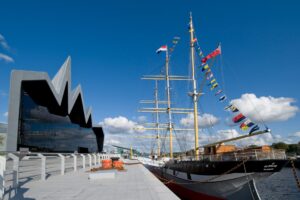
Tall Ship Glenlee
The Tall Ship Glenlee has a 126-year history as a British cargo vessel to a sail training icon of the Spanish Navy. Now visitors can go aboard for tours, see what life was like on the ship, and view maritime-themed exhibitions. There are also regular events.
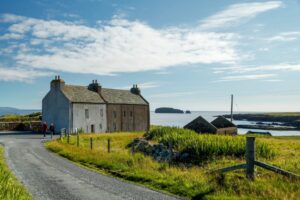
Tangwick Haa Museum
Tangwick Haa Museum showcases the heritage of Northmavine in the north mainland of Shetland. The museum highlights life in Northmavine through objects and images. There are permanent and changing exhibitions, including a recreation of a sitting room from the 19th century.
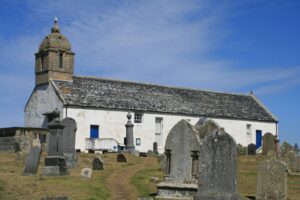
Tarbat Discovery Centre
Tarbat Discovery Centre is located within the old parish church of St. Colman. The Centre has a range of exhibitions including on the medieval building, the Picts and Pictish carvings, the Viking Silver Hoard, and the Tarbatness Lighthouse. The Centre also has an activity area and runs events.

Tarves Heritage Centre
Tarves Heritage Centre is located in a former Victorian School building dating back to 1837. The museum focuses on the heritage of the local area and has range of exhibitions, objects, and photographs relating to local history. Visitors can also see an authentically restored Victorian classroom.

Tayside Medical History Museum
Tayside Medical History Museum at the University of Dundee has over 2,000 objects in their medical history collections. They include items used for teaching and tools for research and diagnostics. The collection is broad, ranging from a necklace which was believed to cure asthma to original bed plaques from Dundee Royal Infirmary.
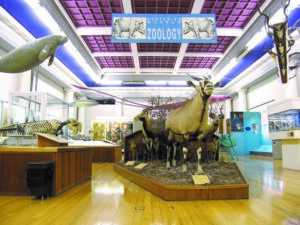
The Hunterian Zoology Museum
The Hunterian Zoology Museum is situated in the Graham Kerr building at the University of Glasgow. The museum showcases the diversity of the animal kingdom from marsupials and reptiles, to sponges that look like glass ornaments and microscopic marine animals.

The Royal Highland Fusiliers Regimental Museum
Based in the Royal Highland Fusiliers HQ in Glasgow city centre, the RHF Museum tells the story of the regiment.
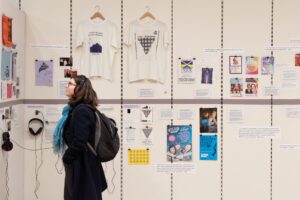
The Wee Museum of Memory, Ocean Terminal
The Wee Museum of Memory at Ocean Terminal Shopping Centre, Edinburgh is a ‘hands on’ museum that supports reminiscence. The museum has ephemera from everyday life that can be looked at and touched to support sharing stories and memories with each other.

The Wee Museum of Memory, West Lothian
The Wee Museum of Memory (West Lothian) in Livingston is a museum that focuses on reminiscence. The museum has objects associated with everyday life that can be looked at and touched to support sharing stories and memories with each other. They are a social space and run weekly sessions as well as welcoming drop in visits.
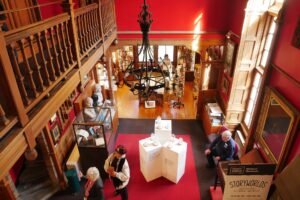
The Writers’ Museum
The Writers’ Museum focuses on the lives of three Scottish writers: Robert Burns, Walter Scott and Robert Louis Stevenson. The museum is run by the City of Edinburgh Council and the collection includes portraits, works, and personal objects such as Burns’ writing desk, Robert Louis Stevenson’s riding boots, and the press on which Scott’s Waverley Novels were printed.

The Wyllieum
The Wyllieum is an art gallery in the heart of Greenock which holds a large collection of artworks by George Wyllie, a famous artist from the area.
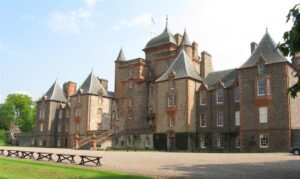
Thirlestane Castle
Thirlestane Castle is a 16th century castle located within the Lauderdale Estate in the Scottish Borders. It has connections to Bonnie Prince Charlie and Mary Queen of Scots. The castle has 17th century Dunsterfield gold gilded plasterwork ceilings and an extensive family portrait collection of The Maitlands, who have lived in the castle since 1590.

Thomas Carlyle’s Birthplace
The house was constructed by Thomas Carlyle’s father and uncle – both local stonemasons. The Arched House has remained virtually untouched since 1881, when it first opened to the public.
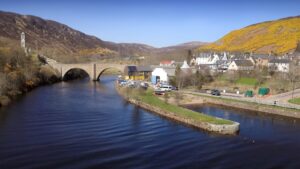
Timespan Heritage Centre
The museum at Timespan, a multi-faceted cultural organisation in Helmsdale, focuses on the local and social history of the land, water, and people of the area. Local stories, images, and objects are contextualised within a wider national and global history. The museum covers a wide breadth of topics including local industries, the Highland Clearances, persecution of witches, and 1869 gold rush.
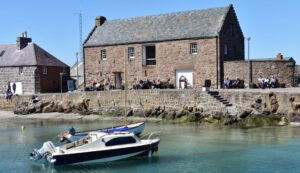
Tolbooth Museum
Stonehaven Tolbooth Museum is located in the oldest building in Stonehaven, which was once used as a prison. The collection focuses on Stonehaven’s heritage, including when the building was a prison. Objects include the Inverbervie stocks, which is one of the few seven hole stocks in the UK.
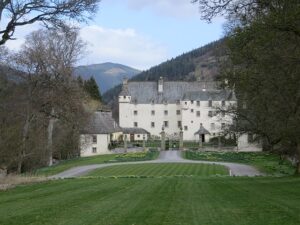
Traquair House
Traquair is Scotland’s oldest Inhabited House, dating back to 1107. It has been lived in by the Stuart family since 1491 and 27 Scottish Kings and Queens have visited the house. Visitors can tour the house where there are 19 rooms open to the public. The tour includes the bed where Mary Queen of Scots slept and a secret escape route for Catholic priests during times of persecution.
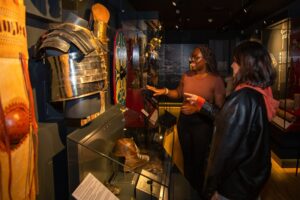
Trimontium Museum
The Trimontium Museum in Melrose is situated close by to the Trimontium Roman fort site near Newstead, a large site which pre-dates Hadrian’s Wall. The museum highlights the history of the Romans in the Scottish Borders, their relationship with the local population, and the fort’s pivotal and turbulent history. In the museum visitors can see archaeological finds from Trimontium, including military equipment and personal possessions.

Turriff Museum and Heritage Centre
Turriff Museum and Heritage Centre preserves and highlights the history of Turriff and the surrounding area. Their collection focuses on objects and stories from Turriff and the museum hosts activities, events and temporary exhibitions. They also run the Session Cottage in Turriff.

Uig Museum
Uig Museum/ Taigh Tasgaidh agus Tasglann Ùig is a community museum ran by volunteers. The collection contains images, objects, and records relating to all aspects of Uig social, economic, Gàidhlig, military and religious histories, including from the Celtic and Viking periods and more modern times. The museum has information on the Lewis Chessmen, which were found nearby in Uig Bay, Ardroil.
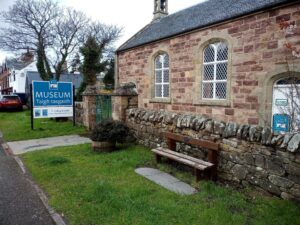
Ullapool Museum
Ullapool Museum is located in a Thomas Telford Parliamentary church building, which is a Category A listed building. The museum has a social history collection connected to Lochbroom and its people, with items and stories relating to crofting, the sea, education and learning, and the founding of Ullapool. There is also an archive reading area, genealogy records, and children’s activity area.
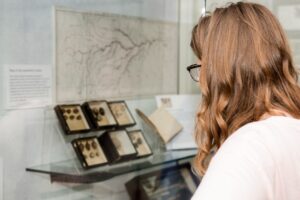
University of Aberdeen Zoology Museum
The University of Aberdeen Zoology Museum cares for a zoological collection with around 75,000 specimens in it. It covers the whole of the animal kingdom, from protozoa to the great whales. The collection has grown from over 200 years of teaching and research by staff and students. In the museum there are zoological displays of animal bones & taxidermy and the permanent displays are complemented by changing temporary exhibitions.
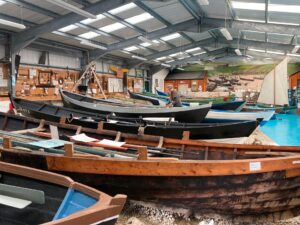
Unst Boat Haven
Unst Boat Haven is a maritime museum that showcases Shetland’s fishing and boat history. The collection includes objects from the herring industry in Unst, such as coopers tools. In the museum there are a collection of wooden boats from Unst’s maritime past, they are all built in the Scandinavian style of construction.

Unst Heritage Centre
Unst Heritage Centre is located in a former school. The collection showcases objects, textiles, and records which preserves and highlights life on Unst. This includes crofting, religion, mining, and textile industries. There is a large collection of hand spun and knit Shetland lace garments created on Unst, some over 100 years old. When originally found these items were very fragile but fortunately skilled people on Unst replicated these garments and rescued long lost lace patterns.
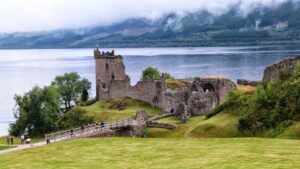
Urquhart Castle
Urquhart Castle is a ruined castle cared for by Historic Environment Scotland. A medieval fortress, it occupies a a strategic position on the banks of Loch Ness. The castle was blown up and left in ruins by government troops during the Jacobite Risings. Visitors can see medieval objects from the castle and a full-size trebuchet on display among the ruins.
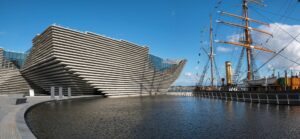
V&A Dundee
V&A Dundee is a design museum that explores Scotland's design heritage – its past, present and future. It’s an international centre of design and showcases Scottish creativity and design from around the world. It’s the first design museum in Scotland and the first Victoria and Albert museum to be built outside London.
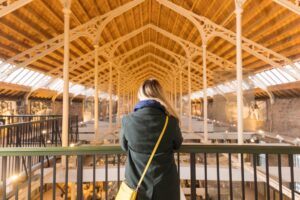
Verdant Works Museum
Verdant Works Museum in Dundee is dedicated to the history of the local jute industry. The museum is housed in the former jute mill, which has been restored to its original 19th-century appearance. The museum features a range of interactive exhibits, displays and activities, which focus on the history of the local jute industry and its workers, as well as the people, places and products involved in the industry.
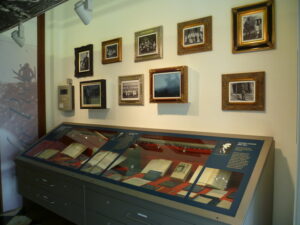
War Poets Collection
The War Poets Collection and permanent exhibition at Edinburgh Napier University Craiglockhart Campus focuses on works of Siegfried Sassoon, Wilfred Owen and selected contemporary poets. It also has items on other individuals with connections to Craiglockhart. The collection has more than 800 items, with many of them unique, such as signed first edition books.
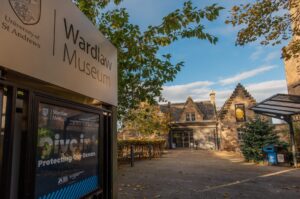
Wardlaw Museum
The Wardlaw Museum aims to tell the story of the University of St Andrews. Through four galleries it showcases the university’s art, history, science, and natural history collections, which consist of over 115,000 artefacts. It also exhibits the university’s research and global impact. The museum has temporary exhibitions, interactive experiences for all ages, a research studio, and learning space.

Weaver’s Cottage
Weaver’s Cottage is a living history museum. It re-creates the living and working conditions of a typical handloom weaver to help give an insight into life before the Industrial Revolution and tell the history of Scotland’s textile industry. There are working looms and spinning wheels, including a 200-year-old loom. Weaver’s Cottage also has a garden, where traditional dye plants are grown.

Wellwood Burns Centre and Museum
Irvine Burns Club runs the Wellwood Museum to highlight Robert Burns' time in Irvine in 1781. The museum is run by volunteers and includes art, objects, letters, and audio/visuals relating to Robert Burns and the Irvine Burns Club. The museum also provides information for researchers.

Wemyss Caves Visitor Centre and Museum
The Wemyss Caves Visitor Centre and Museum tells the story of Wemyss Caves. The site of the caves contains the largest collection of Pictish inscribed symbols in one place, alongside the ruins of the medieval Macduff Castle and later industrial activity. The museum also showcases local geology and history, including industries in the village such as mining and textiles.
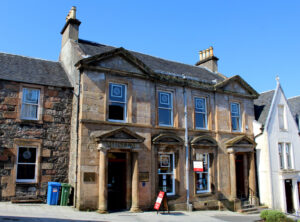
West Highland Museum
The West Highland Museum tells the history of the Scottish Highlands and the Islands. It aims to be a comprehensive museum for West Highland history and the collection includes items relating to Bonnie Prince Charlie and the Jacobite cause, as well as stories of people living in the West Highlands. The museum also has exhibits on archaeology and wildlife.

West Kilbride Museum
West Kilbride Museum has historical items relating to the place or people of West Kilbride. The collection includes photographs and printed materials, children’s toys, medals, local wildlife, and industries in West Kilbride. It also has the West Kilbride Book of Remembrance, with details of those from the town who served during World War 1 and 2.

Westray Heritage Centre
Westray Heritage Centre is a museum and visitor centre dedicated to the history and culture of Westray. The centre houses a variety of exhibits, including archaeological finds, a library with historical documents and photographs, and interactive displays and activities. The centre is also home to the Westray Stone, a unique neolithic stone carving dating back to the 3rd millennium BC. The stone was found in the ruins of a Iron Age settlement and is the only example of its kind in Scotland.

Whalsay Heritage and Community Centre
Whalsay Heritage and Community Centre tells the story of the heritage and traditions of the island of Whalsay. They have a permanent Fishing and Lairds of Whalsay exhibition which shows the history of the fishing industry in Whalsay and has stories, artefacts and photos relating to the Lairds of Whalsay. The museum also has seasonal exhibitions and events for their community.

Whitburn Community Museum
Whitburn Community Museum is located in Whitburn Partnership Centre and tells the story of Whitburn's history. The museum displays are co-curated with the local community. They also have temporary exhibitions and a digital kiosk with changing displays and photos from their collections.
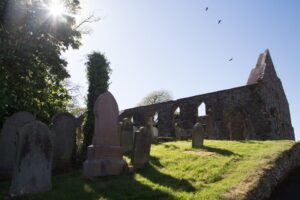
Whithorn Priory and Museum
Whithorn Priory and Museum is an historic site located in the small town of Whithorn, Scotland. It was founded in 1150 by Fergus, Lord of Galloway, and was home to a community of Augustinian canons for more than 400 years. The museum, a modern building constructed in the 1970s, houses a collection of archaeological artifacts from the area, such as pottery, jewelry, and coins.
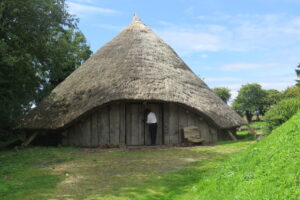
Whithorn Trust
The Whithorn Trust is a charity which manages the Whithorn site. The site contains evidence for the earliest known Christian practice and settlement in Scotland. The site has a permanent exhibition and also temporary displays. They offer guided tours of the outdoor site, including a full-scale Iron Age roundhouse. The Trust also supports research and organises community events.

Wick Heritage Museum
The Wick Heritage Centre has recreated historic household rooms with authentic furnishings, including a traditional box bed and Caithness chairs. The museum also has the Johnston Collection, which shows the work of three generations of Caithness photographers who captured life in the area between 1863- 1975. The collection consists of around fifty thousand glass plate negatives.

Wigtown Museum
A small museum display can be visited within the County Buildings in Wigtown, itself a French gothic style building erected in 1862. The museum tells the story of the Burgh of Wigtown and various items of Wigtown memorabilia are on display, including bronze weights and measures acquired by the Burgh in 1707, the most complete set of early 18th century town weights in Scotland.

William Lamb Sculpture Studio
The William Lamb Studio has been preserved similar to when the artist William Lamb worked there. The studio was designed by Lamb, and it contains a collection of his sculptures, prints and drawings. Visitors can see his workroom and tools, and his living room with his self-styled furniture. The studio is available to visit when openings are ran by The Friends of the William Lamb Studio.